Read in PDF format | Read a summary

A report from Greenpeace and the Runnymede Trust.
Throughout this report we acknowledge the vital work done by people of colour across the globe, who have pioneered movements for environmental justice. This means recognising the work and struggles of Indigenous Peoples, environmental activists, authors and academics, youth climate strikers, organisations and community workers in both the global South and the global North.
These groups have been pushing those in power to confront the environmental emergency, yet their work has not always been acknowledged by NGOs and environmental organisations in the global North. This includes Greenpeace UK, which is working to confront its own position as a global North office within an international organisation, to re-evaluate the importance of social justice at the heart of tackling the environmental emergency, and drive through its commitments to tackle systemic racism.
As a result of systemic racism, people of colour struggling for environmental justice face barriers to being heard, being respected and influencing decisions. This has led to widespread erasure of people of colour who are impacted by the environmental emergency, and exclusion of people of colour as leaders, professionals, academics and experts within sectors dealing with the environmental emergency.
This erasure is having a damaging impact on efforts to tackle the climate and nature crisis. Without solidarity with people of colour, and a rebalancing of power, there will be no just and equitable solutions to the environmental emergency.
We want to extend thanks to Guppi Bola and Leon Sealey-Huggins for their advice and support reviewing this report. Thanks to Greenpeace Africa, Greenpeace Brazil, Greenpeace Turkey and Greenpeace International for their input. And thanks to the inspiring activists and campaigners who we interviewed for this report.
Finally, we would like to acknowledge the work of both the Greenpeace UK and Runnymede Trust teams, including the lead authors of the report – Alba Kapoor, Simon Hood and Nannette Youssef.
PDF report designed by Ravista Mehra. Data visualisation by Laura Yates, with icons illustrated by Paridhi Mundra and Kundanika Chadha © Ravista Mehra.

CEO of the Runnymede Trust
The environmental emergency is without doubt the most pressing and universal crisis society faces. From the ravages of forest fires in Europe and North America to the extensive floods across Asia and South America, around the world the devastating effects of the climate crisis are plain to see – and escalating by the year.
It is increasingly acknowledged that climate change has the greatest impact on those who are the poorest and least able to respond to natural disasters. With people of colour making up the majority of the world’s population, the implications are clear.
This report confirms to the world a fact that should be glaringly obvious: the environmental emergency is rooted in systemic racism. Speaking as a woman from one of the ‘sacrifice zones’ identified in the report, whose father’s village in Bangladesh remains underwater due to the increasing devastation wrought by climate change, this study attests that we cannot overcome the environmental emergency faced by the entire planet without addressing patterns of global racial disparity.
People of colour are most vulnerable to the effects of climate change, whilst being least responsible for environmental degradation and carbon emissions. They are predominantly based in the global South. But even in cities like London and New York, people of colour are disproportionately impacted by the environmental emergency. In these countries, low-income communities of colour not only have less access to green spaces but are more likely to live near car-clogged roads and toxic waste incinerators. In London, small particulate emissions manifest themselves in increased lung disease and reduced life expectancy among working class ethnic minority children. In Los Angeles, you are twice as likely to die in a heatwave if you are Black.
“We cannot overcome the environmental emergency faced by the entire planet without addressing patterns of global racial disparity.”Halima Begum, CEO of the Runnymede Trust
As the COVID-19 pandemic clearly demonstrated, it is precisely because systemic inequalities are so entrenched that when a crisis strikes, certain communities are impacted first, hardest and in multiple ways. Communities of colour were overexposed to and under-protected from the virus, and disproportionately died as a result. We cannot solve global challenges, whether a pandemic or an environmental emergency, without targeted action and support for those communities most affected.
It is through the efforts of those on the frontline, those hit hardest by the environmental emergency, that we can overcome the greatest challenge of our time – the challenge to protect our fragile and precious planet and all its people. We stand on the shoulders of giants who continue to fight so relentlessly to protect their homes, communities and futures.
We must not only fight the environmental emergency, but as part of that we must build resilience and capacity to open up those sealed spaces where the voices of people of colour are not being heard. This is absolutely essential to achieving both climate and racial justice worldwide. What we now need is dedicated and determined action within the environmental movement to recognise the shared and interlinked struggles between the fight for racial justice and the fight against the environmental emergency. For the survival of this generation and every generation that follows, immediate action is required across all sectors, governments and corporations to implement the urgent changes that will address the climate crisis for the citizens of every country on the planet, while there is still time.
The time to start that process was yesterday. For now, we hope this report offers an opportunity to springboard genuine action and change. Such action must include integrating and amplifying the knowledge and experiences of the many, many minoritised communities and climate activists of colour whose voices have been ignored for far too long.
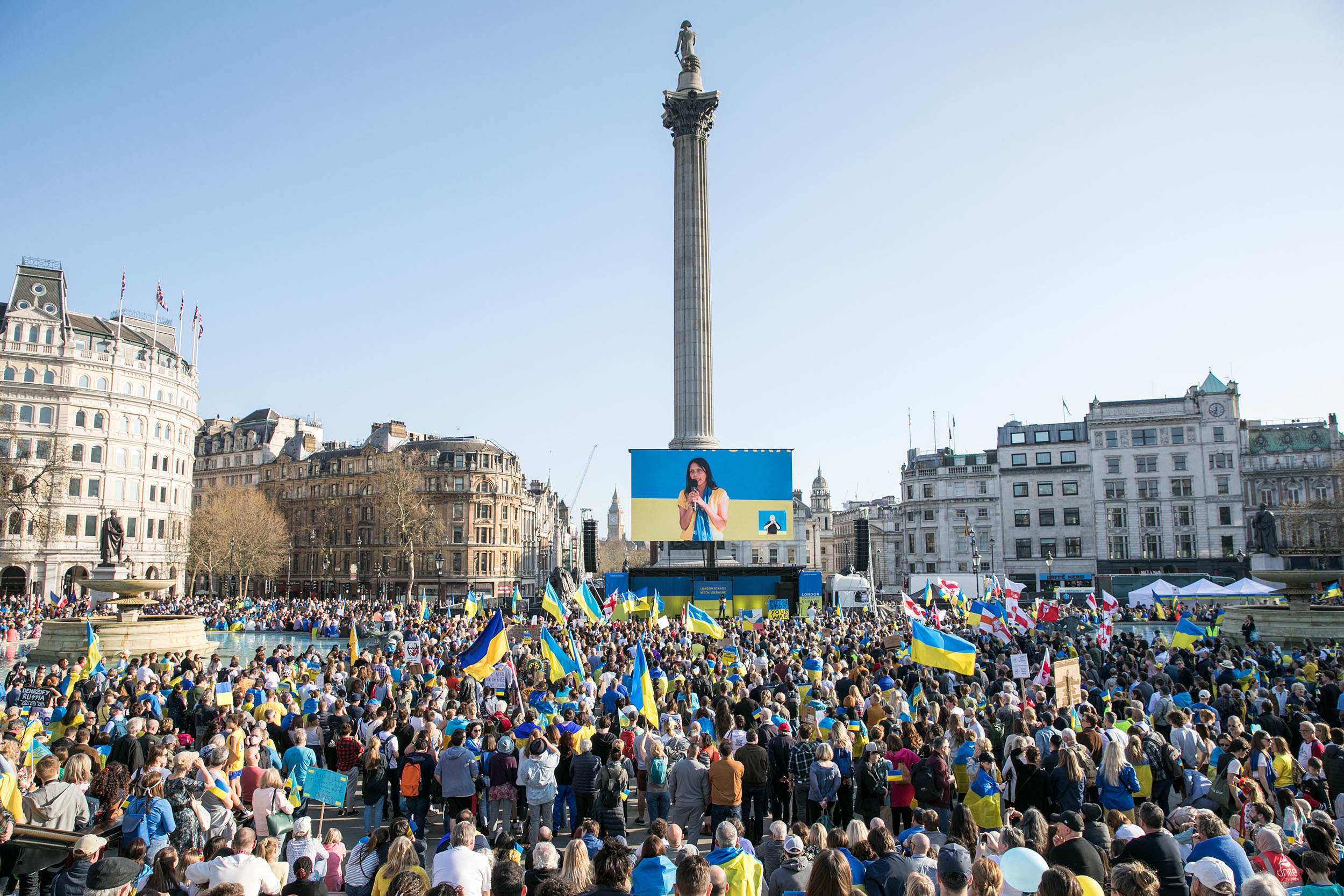
Halima speaks to the march and vigil for Ukraine in Trafalgar Square March 2022, calling on the UK to offer sanctuary to every Ukrainian in need and protect the human rights of all refugees and asylum seekers. © Kois Miah

I would first like to thank both the Runnymede Trust and Greenpeace UK for giving me the opportunity to write the foreword for this ground-breaking report which tackles these interlinked, under-reported worldwide issues – systemic racism and global environmental justice.
In a book published last year, We have a Dream, I wrote about 30 young environmentalists of colour, many from Indigenous Peoples around the world, all of whom are facing, challenging and fighting racism, environmental injustices and human rights abuses, in order to protect their environment and culture.
Writing this book solidified my belief that real change in the global South can only happen when that change is developed, owned and led by local people. Yet the global North has a huge role in ensuring that the global South can overcome the political, economic and technical barriers it faces to develop and improve the life of its peoples, whilst still sustaining and protecting its environment.
So many of the human rights issues linked to the removal of land impacting Indigenous and local people around the world stem from colonialism and its legacy. It’s the continuation of an ideology based on white people, corporations and global conservation charities believing that they understand the best actions needed to implement conservation and environmental work around the globe, often to the detriment of those originating from those places.
I am half Bangladeshi and have visited Bangladesh several times, seeing first-hand the effects of climate change – internal climate refugees, land erosion, and social tension. Although the Bangladeshi economy is growing at an average of 6-7% GDP per year, and income per capita is rising, resulting in fewer people living in extreme poverty, social justice has to remain at the heart of tackling climate breakdown and dealing with environmental emergencies such as cyclones, flooding and crop failures.
“Social justice has to remain at the heart of tackling climate breakdown and dealing with environmental emergencies”Mya-Rose Craig
High population growth is still often used in the global North to shift the blame for climate breakdown onto countries in the global South, although a big factor in population growth is now caused primarily by the increased life expectancy spans rather than birth rates in the global South. This is a red herring and is used by governments and corporations in the global North for inaction and maintaining the status quo. The real issue is the level of rampant consumerism in the global North, which is fuelling the destruction of our planet.
Countries like Bangladesh must be supported to implement a just transition so that they can secure and protect their economy, provide a sustainable future to their people as well as achieve social and political stability with the introduction of new and developing green technologies.
It has to be recognised and accepted that systematic racism does not just exist, it is flourishing, and that global environmental justice will never be achieved unless systemic racism is challenged head on. Responsibility and action for tackling environmental breakdown must be accepted by the global North.
I ask you to use this report and join me in the fight for equality and justice, alongside the fight to solve the environmental emergency, and in doing so, stand shoulder to shoulder with people all over the world.
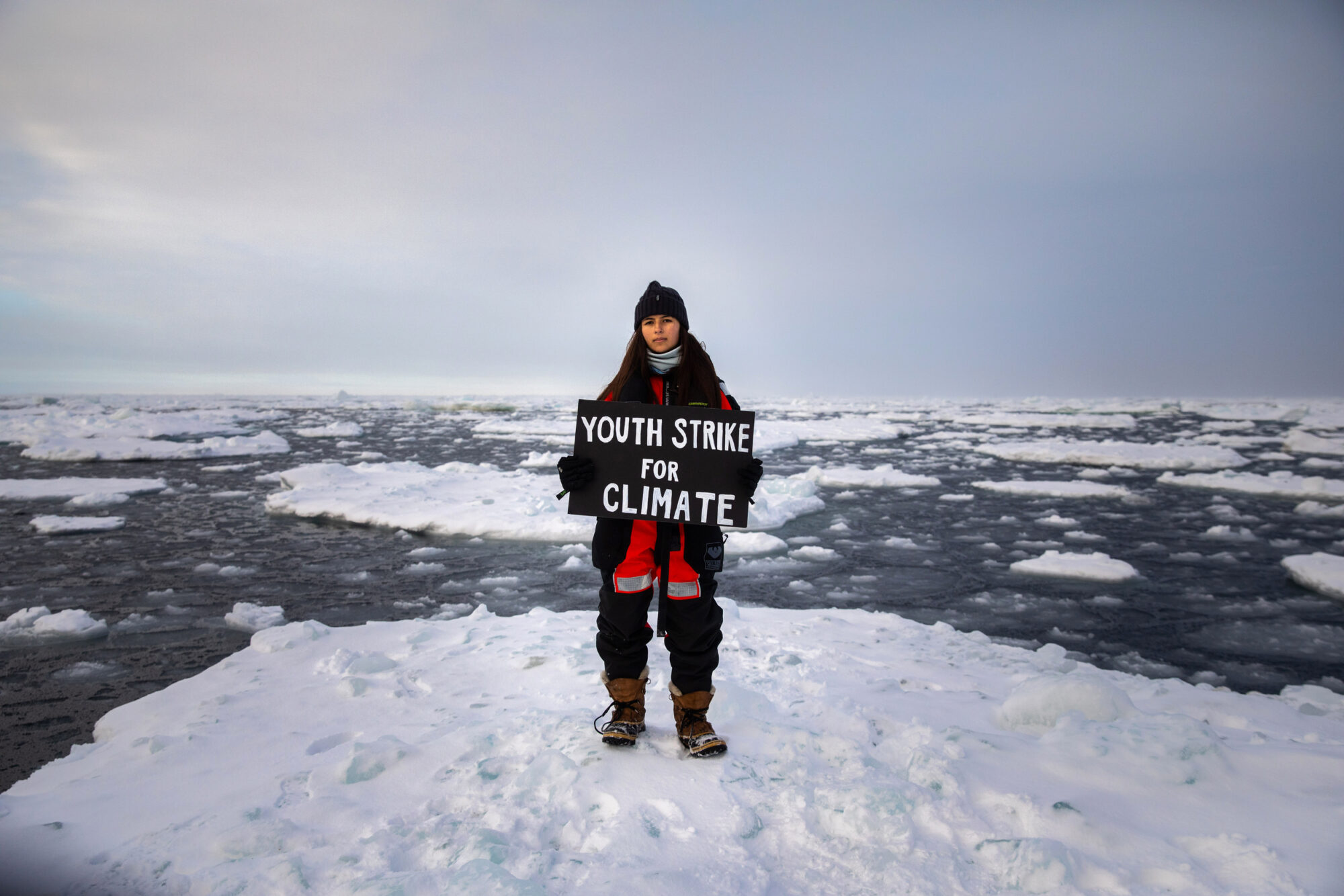
Mya-Rose Craig held the most northerly climate strike in 2020, when she joined Greenpeace ship Arctic Sunrise in the Arctic to document and bear witness to the 2020 sea ice minimum. © Daniella Zalcman / Greenpeace
We have used the phrase ‘people of colour’ throughout this report to emphasise the common experiences of systemic racism faced by communities throughout both the global North and the global South, including Black and Indigenous groups.
We recognise that the phrase has its limitations, in that it homogenises different ethnic minority groups that have significant differences between them. However, we have chosen to use the phrase here as a signifier of communal and diasporic experiences. Throughout the report we describe the specificities of different groups of people of colour’s experience, where possible. In Part 3, where statistics are used which adopt the term ‘Black and Minority Ethnic’, we have done the same.
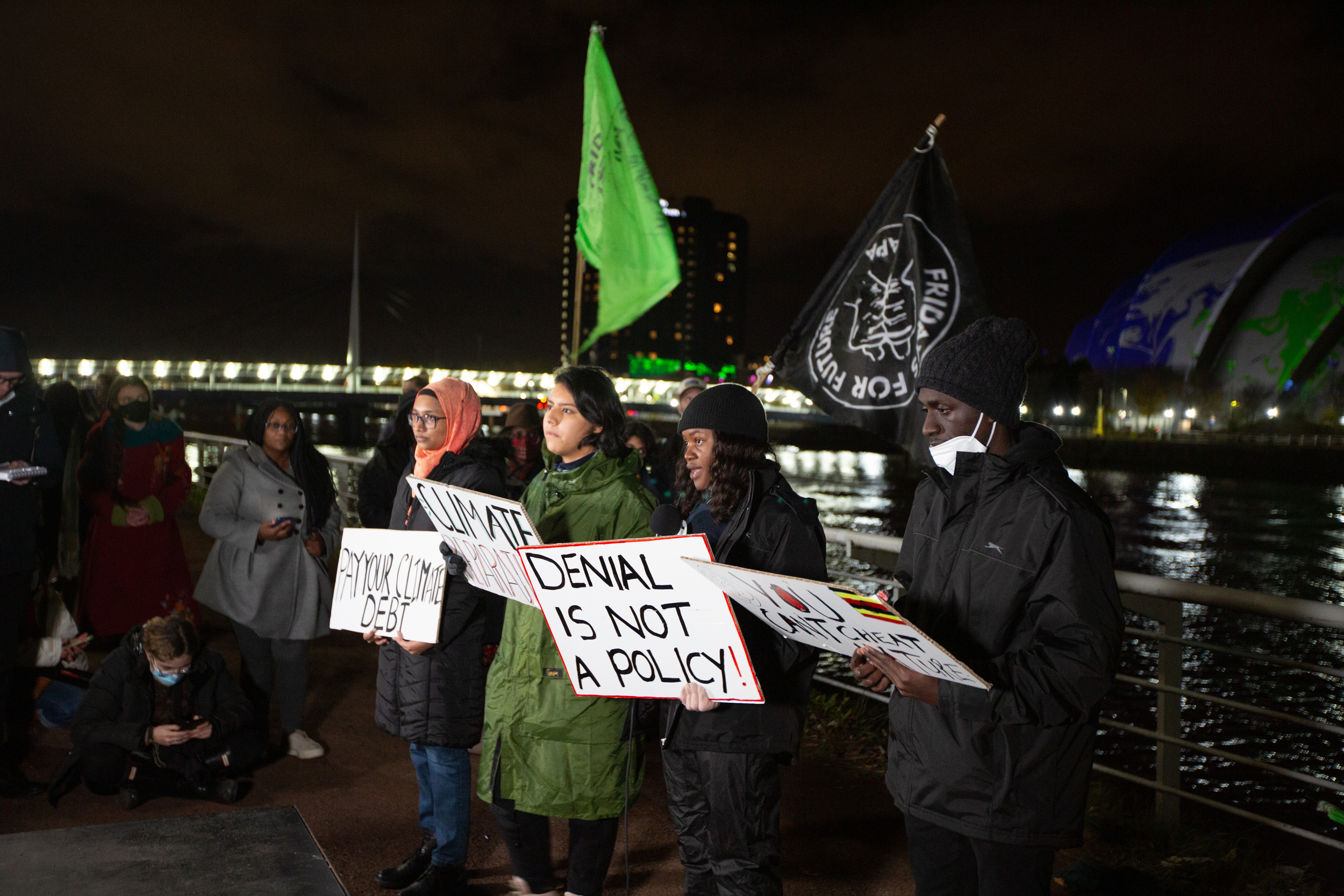
The term ‘global South’ emerged as a label which sought to overcome older, negative terms such as the ‘Third World’ to refer to the regions of Oceania, South America, Asia and Africa. It has historically been linked to processes of decolonisation and nation-building.
In this report, the terms ‘global North’ and ‘global South’ are intended not as a geographical classification, but to refer to unequal global power relations. We use the terms to address political, cultural and economic inequalities between regions.
The term ‘global South’ is often criticised as being a ‘Northern’ concept, developed by European and American academics. Throughout the report we have been cautious not to generalise the global South and consider it a homogenous entity with one shared history. We also recognise that applying this terminology to current events is complicated by the growing political and economic power of countries such as China and India, as well as global South owned corporations.
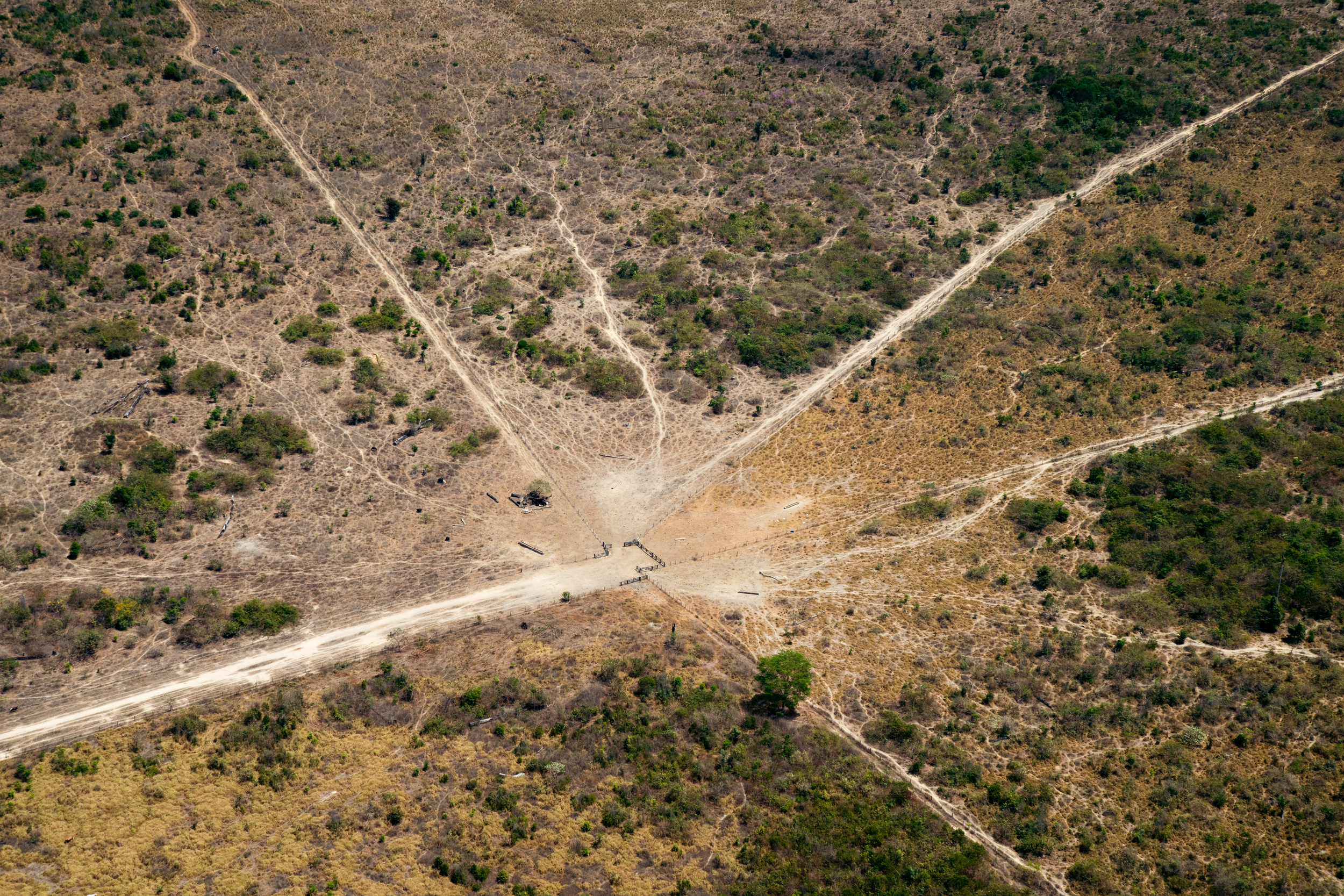
The visual representation of people of colour, by people of colour, is essential in accurately and respectfully diversifying visual storytelling. Most of the data in this report is about human life, so it felt important to attempt to humanise that data. These icons are commissioned by and copyrighted to Ravista Mehra, whose research is based in decolonising the visual representation of human narratives. She worked alongside illustrators from the global South, Paridhi Mundra and Kundanika Chadha. While recognising it is not possible to represent everybody in this small number of icons, they paid careful attention to ensure that the representation of individuals is not only diversified through their ethnicity, but also their gender, age, size and disability.
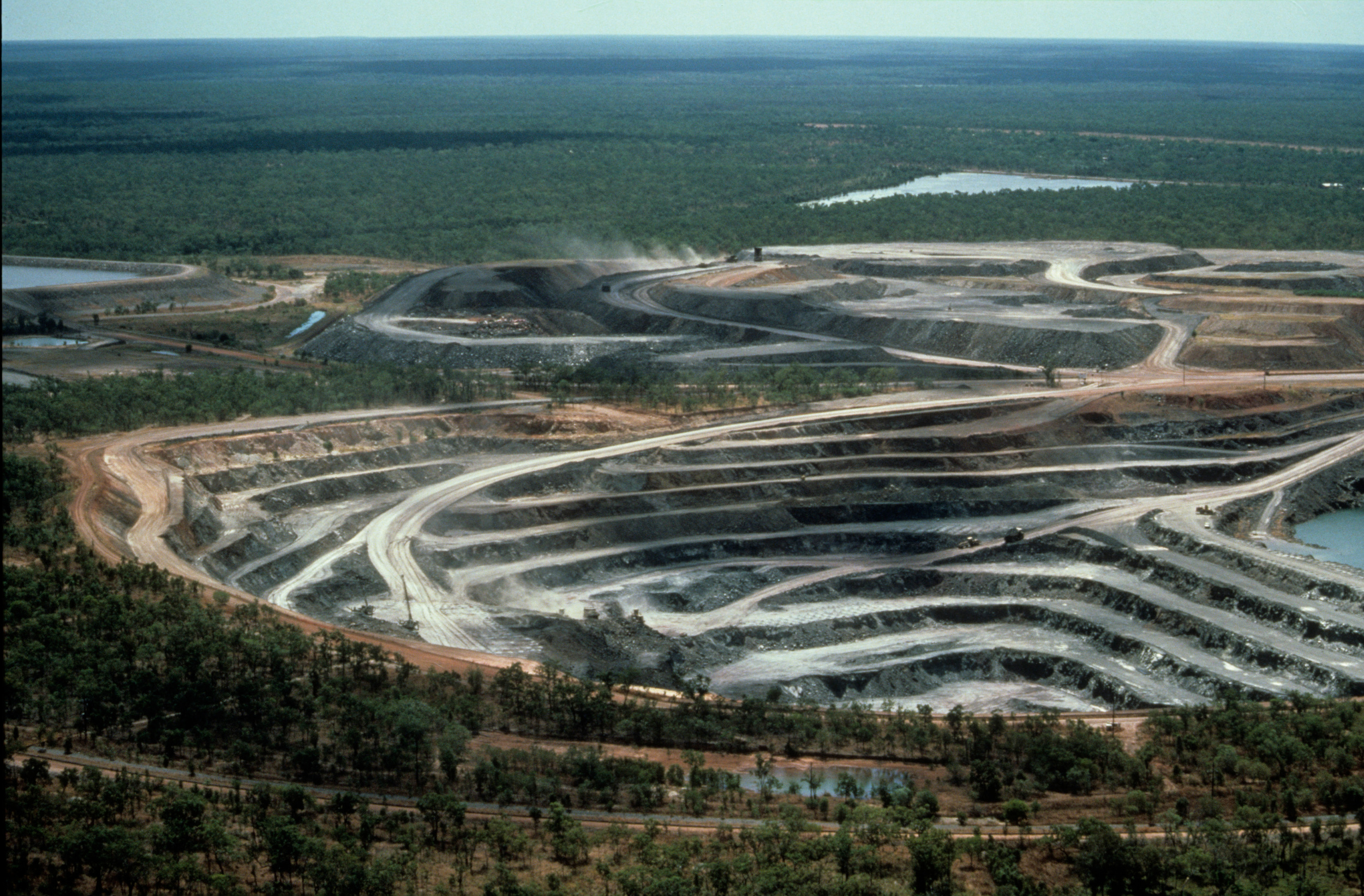
If you're unfamiliar with the key terms used in this web report, we've created an environmental justice glossary to explain the language. We've also hyperlinked terms when they first appear so you can easily navigate to read them in the glossary.
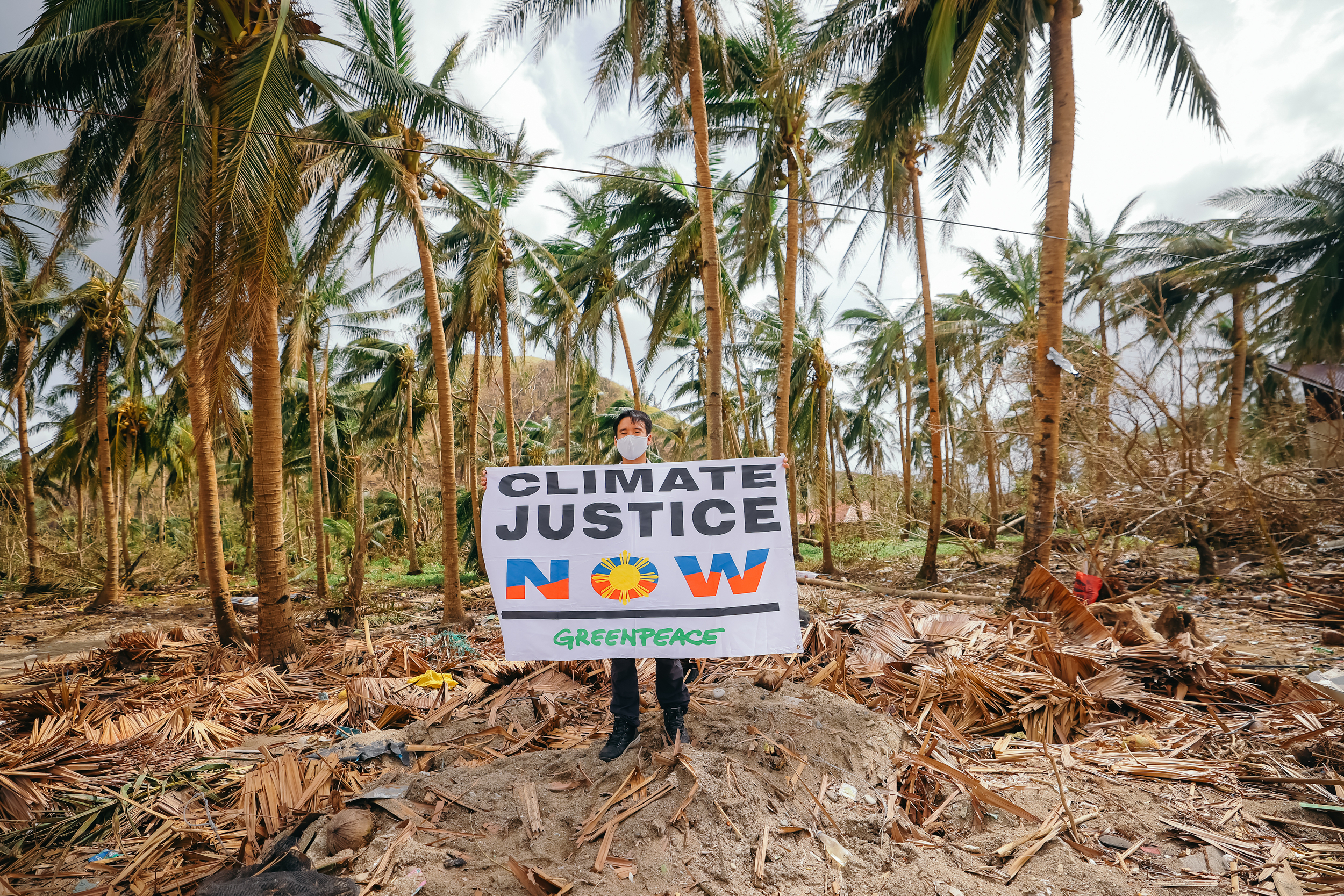
Environmental justice cannot be realised without racial justice
Black people, Indigenous Peoples and people of colour across the globe bear the brunt of an environmental emergency that, for the most part, they did not create. Yet their struggles have repeatedly been ignored by those in positions of power. Global governance systems, including international climate negotiations, have for decades failed to act to protect Black and Brown lives. Systemic racism operates worldwide to produce inequalities in housing, healthcare, education, the criminal justice system, and in the outcomes of the environmental emergency.
The urgency of this could not be clearer: temperature variability is already linked to five million deaths globally every year – the majority of which take place in the global South, showing the vulnerability of some of these communities. Across India, Bangladesh and Pakistan, natural disasters displace more than ten million people each year. Across the continent of Africa, the environmental emergency threatens the lives and livelihoods of 100 million people, many of whom are already living in extreme poverty. In the UK, people of colour, those living in areas of high deprivation, marginalised groups such as refugees and asylum seekers, disabled people and those experiencing homelessness are all more vulnerable to health problems related to climate change.
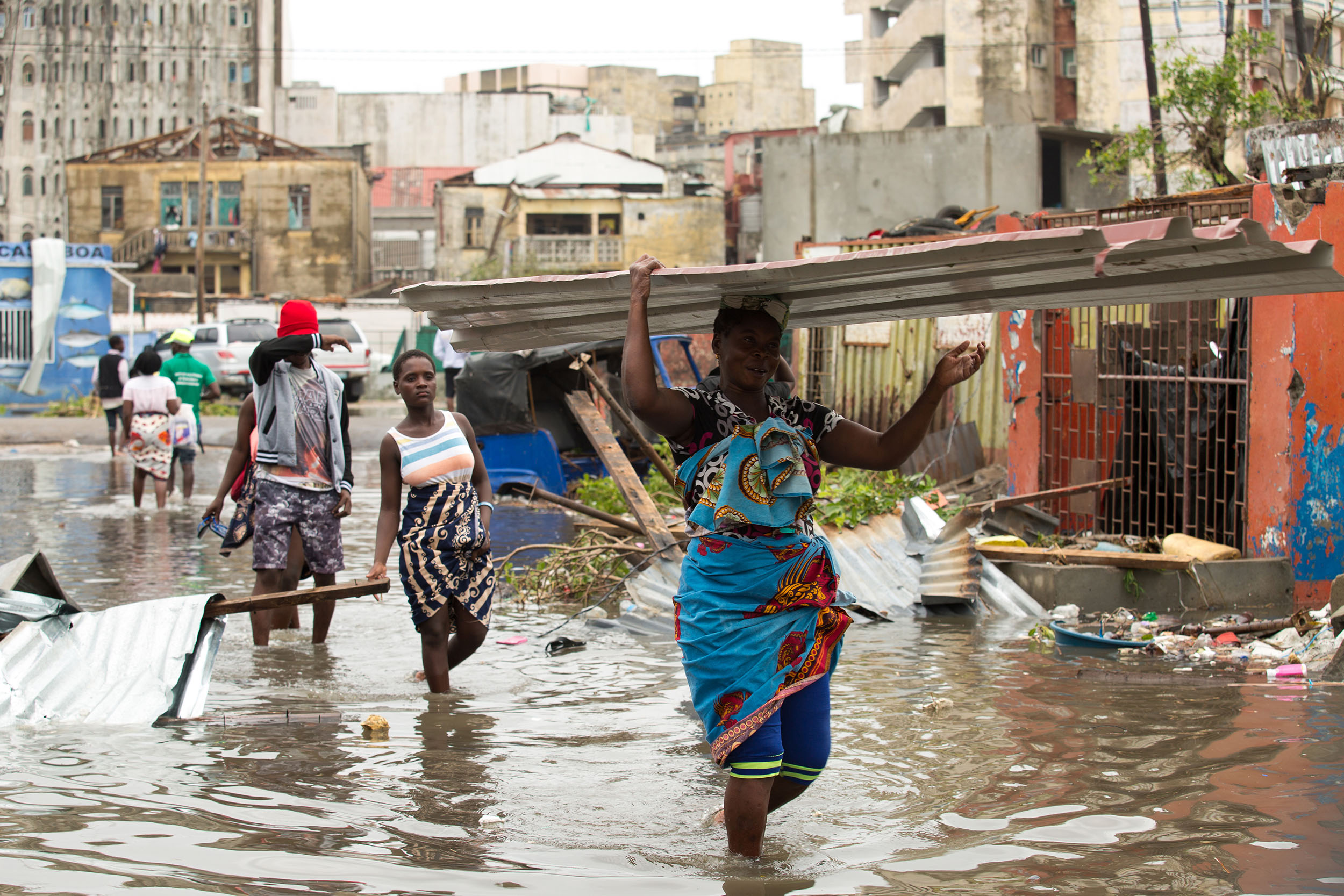
The aftermath of Cyclone Idai, Mozambique, March 2019. © Denis Onyodi/IFRC-DRK-Climate Centre
“The urgency of this could not be clearer: temperature variability is already linked to five million deaths globally every year – the majority of which take place in the global South.”
Many groups in the UK – including Greenpeace and others within the environmental sector – acknowledge they have not done enough to recognise the links between systemic racism and climate change. This report is therefore intended as a resource that will help to consolidate anti-racist thinking and provide an overview of the role that systemic racism plays in the outcomes of environmental emergency today. Throughout this report, we seek to show the role that British colonialism, the British state and UK supply chains have in this.
We provide analysis of the situation across Nigeria, Brazil, Turkey, Senegal and Mauritania to describe how global extractive economies – with their links to the UK – have caused huge damage to the lives and livelihoods of people of colour, and the role that racism has in the marginalisation of those communities. Closer to home, we demonstrate how environmental harm in the UK is concentrated in more deprived areas, and also disproportionately impacts people of colour in working class communities.
We argue that the outcomes of the environmental emergency cannot be understood without reference to the history of British and European colonialism, which set in motion a global model for racialised resource extraction from people of colour. While it would be impossible to cover this subject in its entirety in this particular report, we aim to take an illustrative approach by providing compelling examples which demonstrate how the environmental emergency and racial discrimination are intertwined, to understand how and why they must be addressed together.
An environmental emergency built on racist practises: the global divide
To understand the links between systemic racism and the environmental emergency, we have to start with the global picture.
People of colour across the globe are disproportionately losing their lives and livelihoods as a result of the environmental emergency. Climate change is exacerbating already rampant global inequalities, and areas in the global South are being reduced to ‘sacrifice zones’, in which powerful states and corporations are ignoring the consequences of environmental damage. Failure to take actions that would help mitigate the devastating impact of the environmental emergency on global South countries is part of the impact of systemic racism.
The countries most affected by extreme weather events are mostly in the global South – including Mozambique and Zimbabwe in Africa, as shown in Figure 1. Mozambique experienced losses to infrastructure, production and social sectors of an estimated US$3.2 billion in 2019 due to natural disasters, while it contributed just 0.02% of global carbon dioxide emissions. These losses follow the impact of the catastrophic tropical Cyclone Idai, which hit Mozambique, Zimbabwe and Malawi in March 2019, causing flash floods and landslides that affected an estimated 2.5 million people. Just over a month later, in April, Mozambique was hit by another cyclone, the strongest to make landfall in the country since modern records began. The UN has estimated that these cyclones have left 2.2 million people in need of urgent assistance.
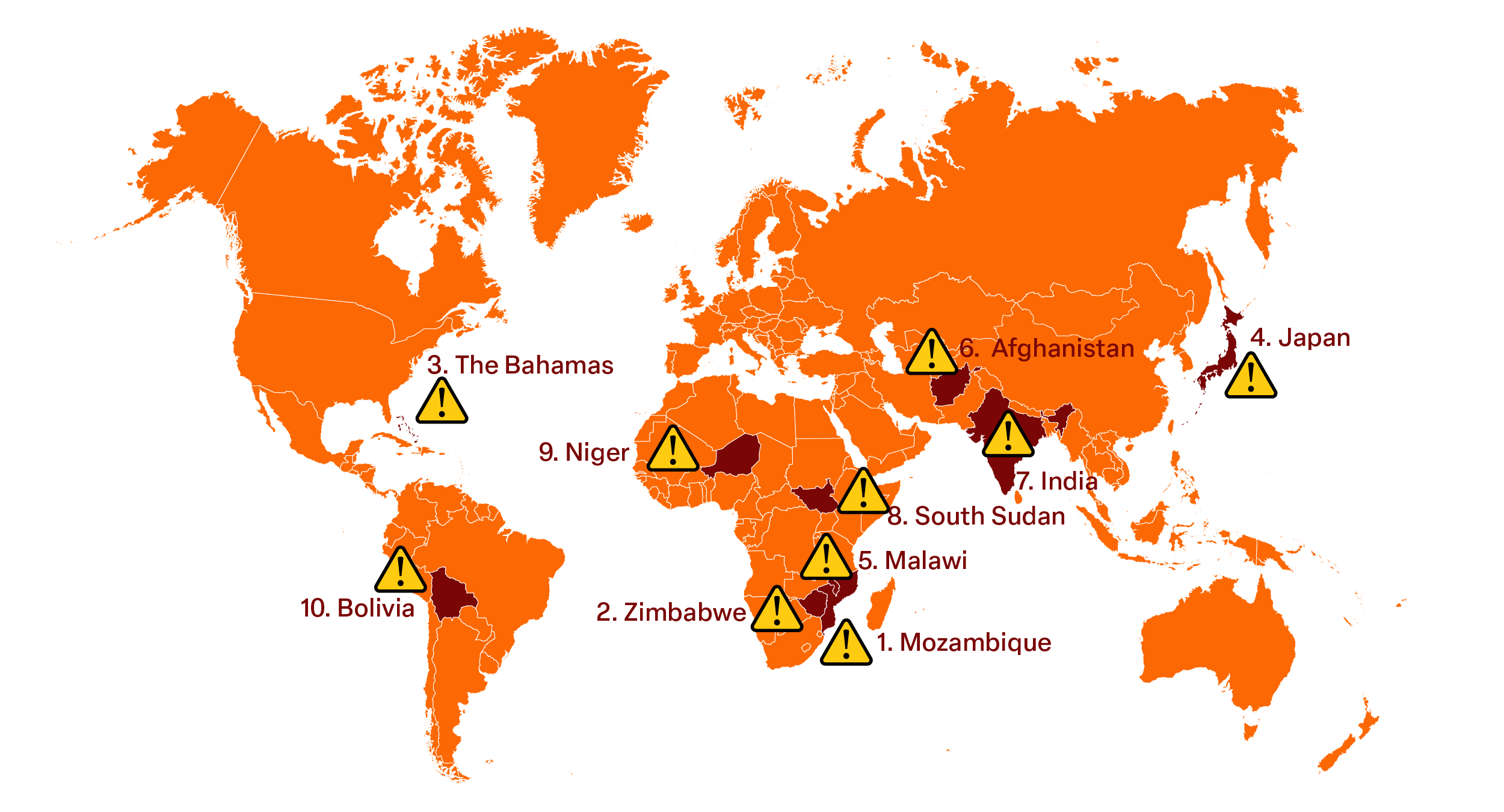
The ten countries most affected by impacts of weather-related loss events (storms, floods, heatwaves etc.) in 2019. Human impacts (fatalities) and direct economic losses were analysed, with Mozambique suffering the most. Source: Global Climate Risk Index Data visualisation © Greenpeace / Laura Yates, with icons © Ravista Mehra
This scale of destruction is not inevitable. Many countries in the global South currently lack the financial resources to anticipate, adapt and recover quickly from natural disasters and extreme weather events, making them more vulnerable. These places are also more susceptible to damage to infrastructure than countries in the global North. In 2013, the US House of Representatives approved US$50 billion in aid following Hurricane Sandy – 12 times more than the combined spending of the 34 poorest countries on reducing the consequences of the climate crisis each year.
Many countries in the global South have now asked for their losses and damages to be recognised at the UN and their financial needs covered by those ultimately responsible for current emissions concentrations.
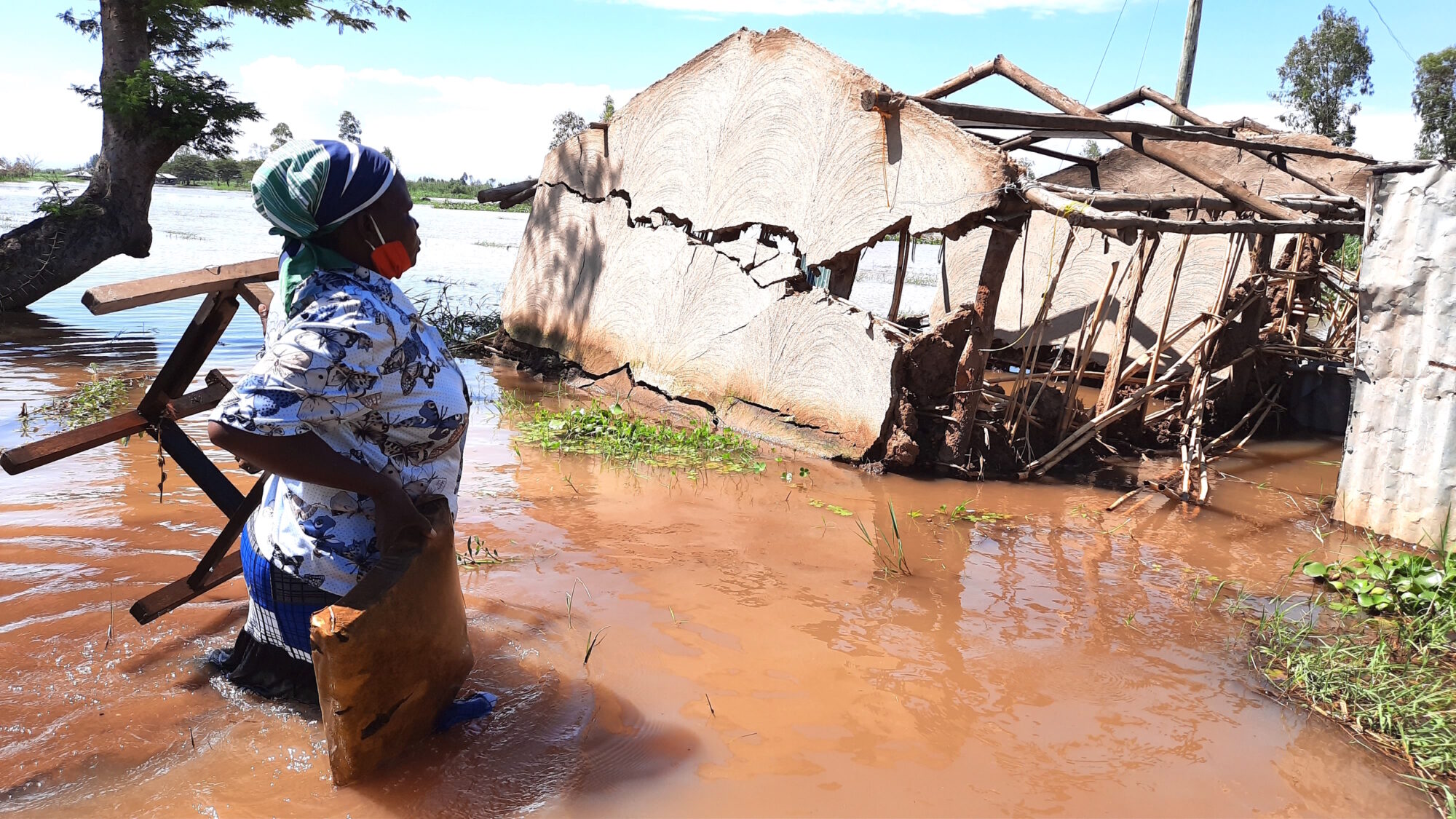
Floods in Migori and Homa Bay Counties in Kenya in May 2020 left thousands displaced, with hundreds of lives lost, and crops and livestock destroyed. © Bernard Ojwang / Greenpeace
Women are among those most vulnerable to the damages caused by climate change, as they are disproportionately likely to be living in poverty, and to also rely on the availability of natural resources for their income. According to the charity Oxfam, women are more likely to die than men in environmental disasters, and are often “unable to migrate to look for shelter and work when disaster hits.” In addition, in the aftermath of these disasters women are vulnerable to sexual assault and lack the services that they need for their protection.
Disabled people are among those most “adversely affected in a climate emergency” according to the United Nations Human Rights Office, and such emergencies are becoming more and more frequent. Policymakers often overlook the impacts of environmental harm on the rights and agency of disabled people.
Indigenous Communities are more likely to be amongst the first and worst affected by climate change, owing to their close relationship with the natural environment and its resources including, for example, along the coastline and in the Arctic. This geographic vulnerability is exacerbated by the marginalisation of Indigenous Peoples by governments around the world.
As highlighted by debt justice campaigns operating in the UK, high levels of debt are undermining the ability of global South countries to combat the environmental emergency. The world’s poorest countries spend five times more on debt payments to foreign banks, governments and financial institutions than on the infrastructure needed to deal with the environmental emergency.
“The world’s poorest countries spend five times more on debt payments than on the infrastructure needed to deal with the environmental emergency.”
Debt crises in countries in the global South sometimes have direct links to European colonialism. Haiti, one of the most at-risk countries in the Global Climate Risk Index, is one of the poorest countries in the world – partially following debt repayments to France “for having the temerity to throw off its colonial master and establish itself as the first Black republic of the ‘new world’”.
Mozambique, which has struggled with a long history of indebtedness following Portuguese colonial rule, was thrown into a debt crisis in 2013 following the revelation of massive hidden loans from the London branches of the banks Credit Suisse and VTB Capital.
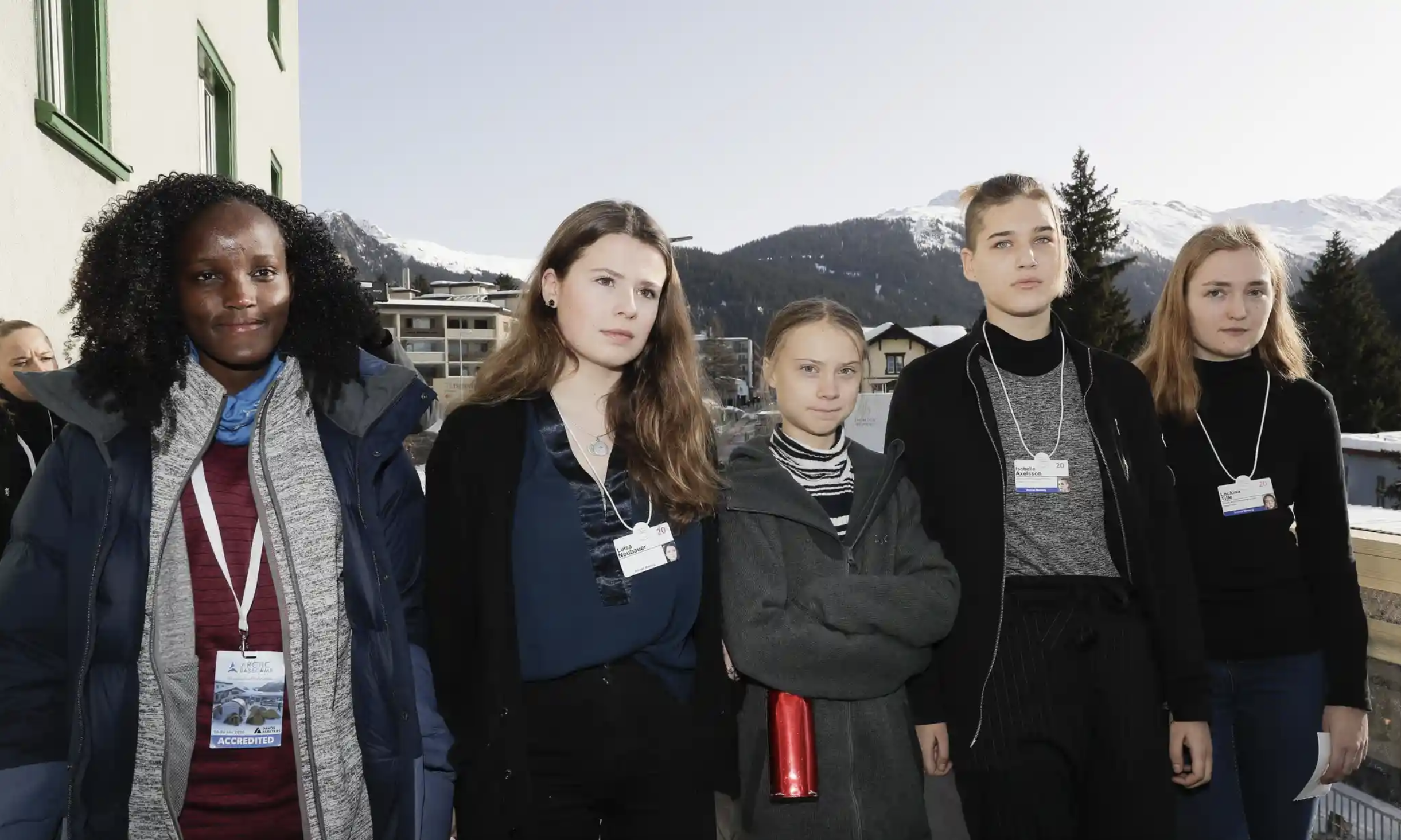
Climate activists Vanessa Nakate, Luisa Neubauer, Greta Thunberg, Isabelle Axelsson and Loukina Tille, from left, campaigning at Davos in 2020. Nakate was cropped out of early published versions of the photograph. © Markus Schreiber/AP
The environmental emergency tends to happen along racial lines, and is set to exacerbate the existing disregard for Black life. This disregard is shown in how perspectives on the environmental emergency from professionals, activists and leaders in the global South are left out of media reporting and academia in the UK. Climate change research and reporting continues to be driven by richer countries focusing on narratives of suffering facing white-majority communities.
Vanessa Nakate, a prominent Ugandan climate justice campaigner, said at the COP26 climate negotiations in Scotland in November 2021 that “people of colour are on the front line of the global climate crisis… but [are] not at the front line of the world’s newspapers”. The humanitarian aid organisation CARE International found that the ten most underreported humanitarian crises in 2021 were concentrated in the global South – with six in Africa (Figure 2). A recent study found that of the 100 most cited climate change research papers over the last five years, almost three quarters were affiliated with institutions in North America, Europe or Australia. Less than 1% of authors were from the African continent.
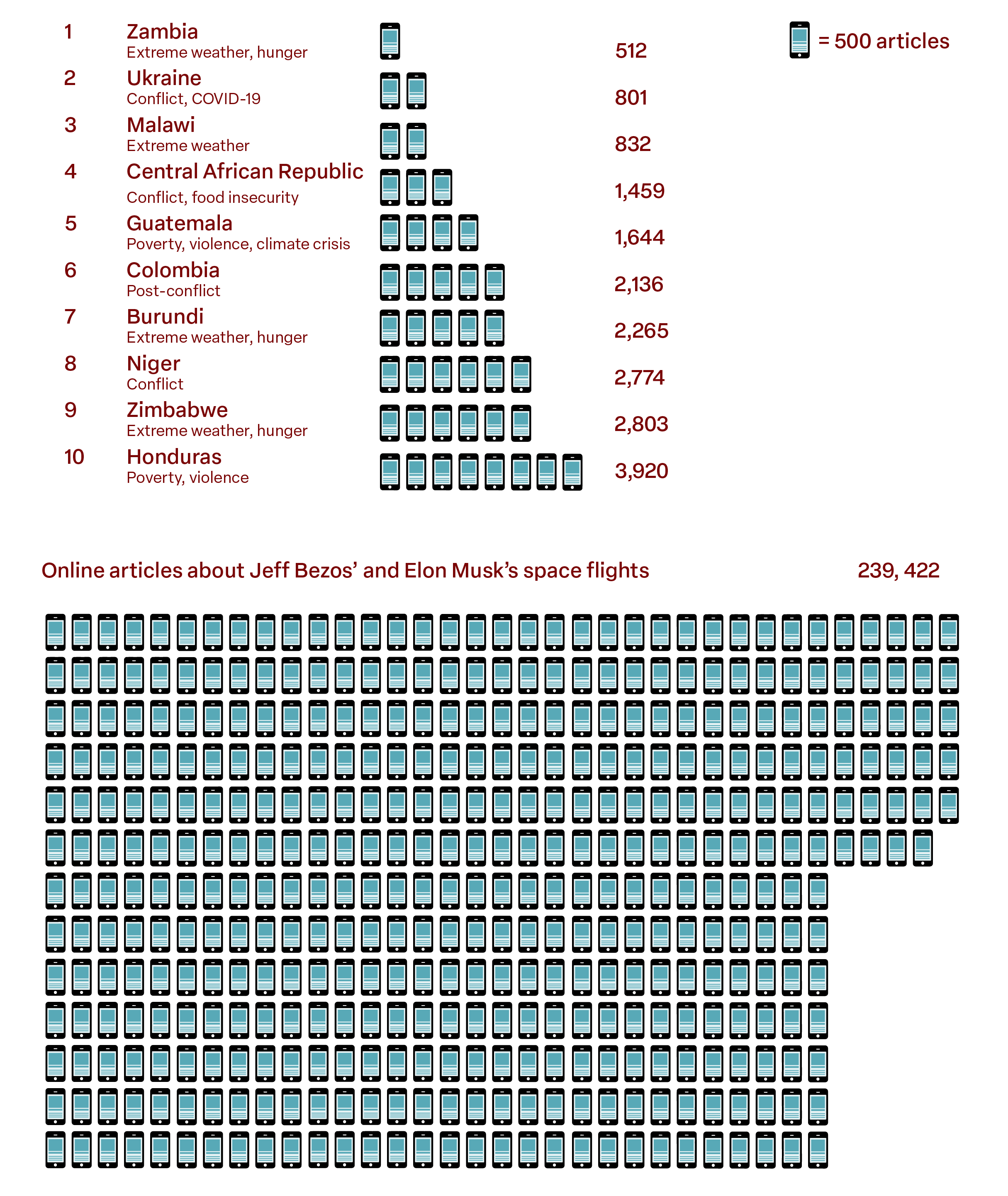
Number of online articles between 1 January and 30 September 2021. Source: CARE International Data visualisation © Greenpeace / Laura Yates, with icons © Ravista Mehra
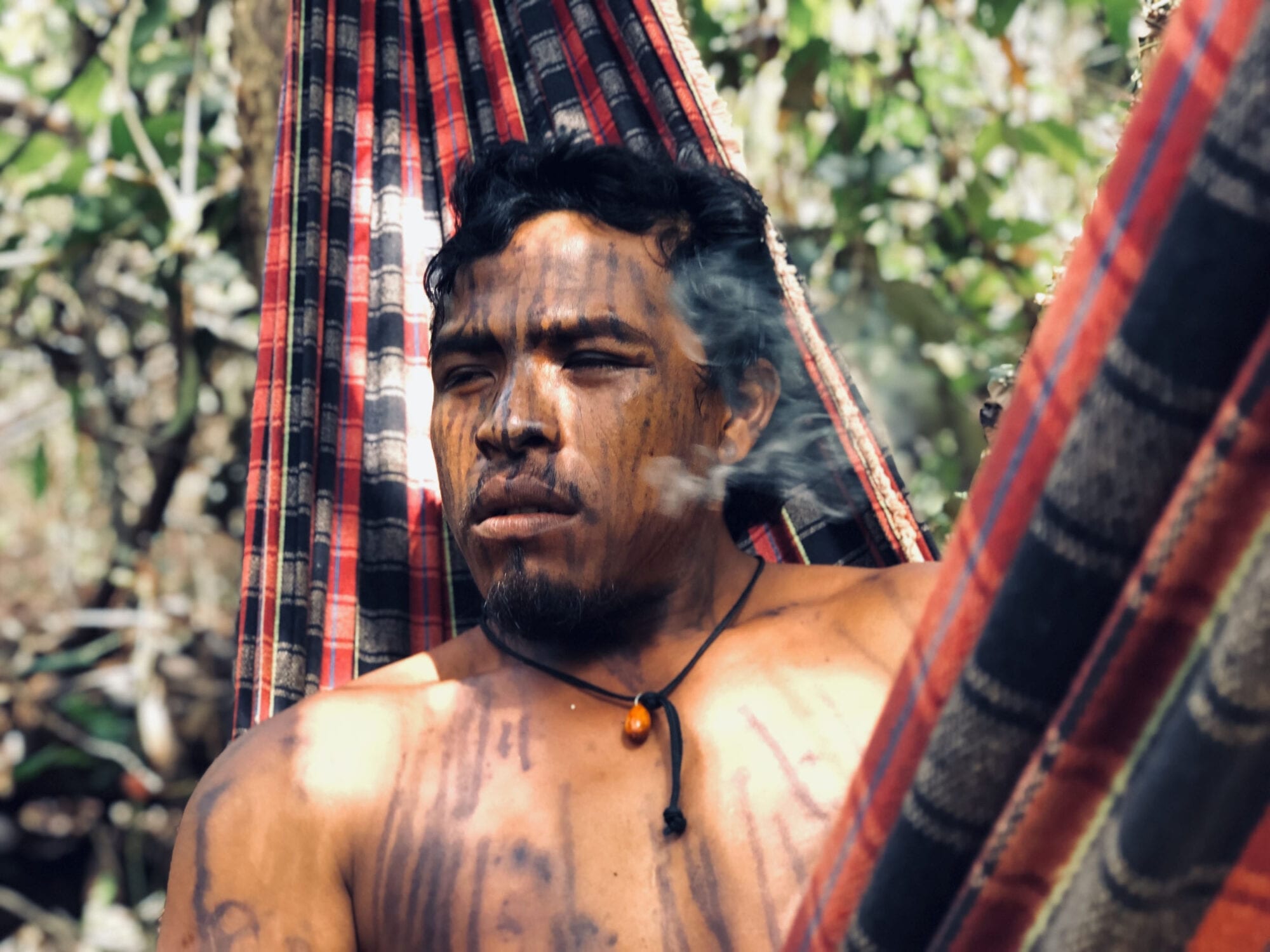
Paulo Paulino Guajajara, a young member of the Indigenous Guajajara community, one of Brazil’s largest, was shot dead by illegal loggers on 3 November 2019. © Patrick Raynaud
Many groups fighting for environmental justice in the global South are highly concerned with the rapid industrialisation some of their countries are undergoing, and are working towards alternatives to the extractive economy.
It should be noted that environmental activists in the global South face great danger in their work. In 2020, 227 environmental activists were killed around the world. The majority of those murdered were from the global South.
People of colour in the global South are currently facing the consequences of an environmental emergency – one which they are much less likely to have created than people in the global North. High income global North countries, including the UK, have a historic responsibility for emissions, and even today there continues to be glaring disparities in carbon dioxide footprints.
Cumulative carbon dioxide emissions from hundreds of years ago have determined the extent of global warming today. According to a leading study in the field, over the last 150 years, taking population size into account, countries in the global North have been responsible for 92% of excess emissions – with the remaining 8% coming from the global South. The US and the EU alone make up 69% of the total. Indeed, up until 1882, more than half of the world’s cumulative emissions came from the UK alone.
“People of colour in the global South are currently facing the consequences of an environmental emergency – one which they are much less likely to have created than people in the global North.”
What this historical emissions data suggests is a process of “atmospheric colonisation”, in which a small number of high-income, global North countries have historically emitted far more than their “fair share”.
Disparities in per capita carbon dioxide footprints are even more stark. In the UK, the average person will have emitted more carbon dioxide in two weeks than a resident of Malawi, Ethiopia, Uganda, Madagascar, Guinea and Burkina Faso will in a year.
Emissions in the global South have increased by an average of 4.1% from 7.1 billion metric tonnes of carbon dioxide in 1990 to a staggering 21 billion metric tonnes of carbon dioxide in 2017. China, Brazil and India are now among the top 10 greatest emitters. Indeed, a recent study shows that China’s carbon dioxide output has more than tripled since 2000.
Therefore, it’s important to note that all governments should be striving to reduce their emissions. At the same time, it remains interesting to compare per capita emissions from heavily industrialised countries in the global South – which are strikingly low – to those in the global North, whilst recognising that these categories are simplifications. For example, whilst India produced around 7% of the world’s carbon dioxide emissions in 2020 (roughly the same as the EU and about half of the US) , it has a far larger population than both of these regions combined, and is much poorer, with hundreds of millions of people lacking reliable access to electricity. The citizens of China and India are associated with 9.2% of all global emissions, while North American and European citizens account for 24.5% of all current global emissions.
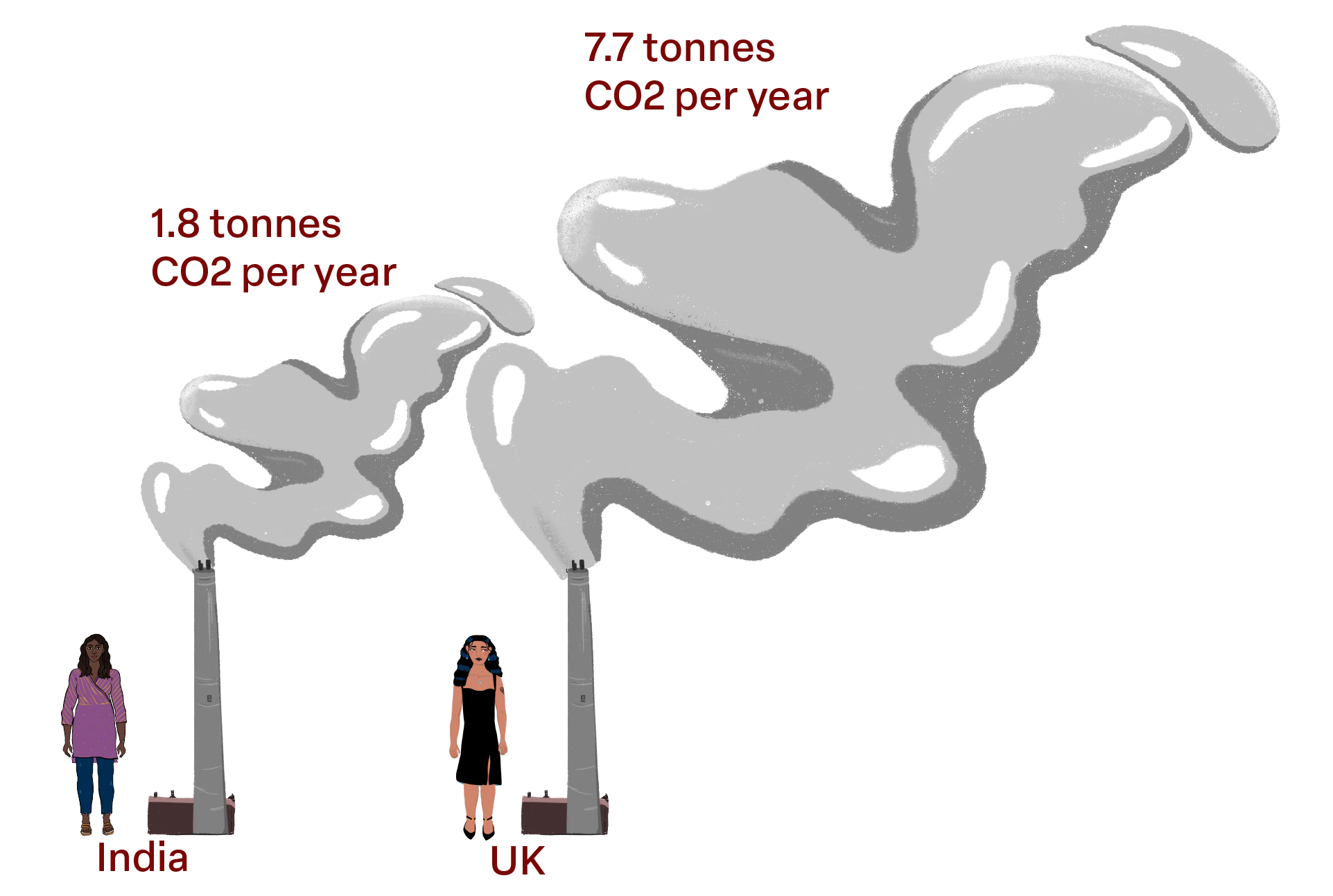
Annual consumption-based (ie. adjusted for trade) CO2 emissions per capita in 2019. Source: Our world in data/Global Carbon Project Data visualisation © Greenpeace / Laura Yates, with icons © Ravista Mehra
The impact of the environmental emergency on people of colour today ought to be understood alongside British and European colonialism. Though emissions before the end of the 19th century are dwarfed by later figures, colonisation established the model of a global extractive economy, which today still sees raw materials, such as fossil fuels, palm oil, grain, soya and fish, from the global South plundered for profits realised largely in the global North. It also established a model through which the air and lands of the global South have been polluted or used as places to dump waste that the global North does not want. As American climate justice activist Elizabeth Yeampierre puts it, “climate change is the legacy of extraction, of colonialism, of slavery”.
“Climate change is the legacy of extraction, of colonialism, of slavery.”Elizabeth Yeampierre, climate justice activist
From the 15th century onwards, European powers exploited resources, land and labour from Asia, the Americas and Africa to further profits. In India, from 1765 until the 1930s Britain drained the equivalent of an estimated US$45 trillion dollars, according to tax and trade data. Historians argue that the industrialisation of Britain relied on the deindustrialisation of India, in which Indian raw materials were brought back to Britain and exported across the world.
In Africa, “rapacious human extraction” defined the slave trade, which saw an estimated 13 million people captured and stolen for profit. Following the Berlin Conference of 1884 to 1885, European powers divided Africa between themselves in search of resources to exploit across the continent: the division of land functioned as a proxy for the division, among colonial powers, of access to the extraction of minerals, food and raw materials.
Through this process, Britain seized control of Egypt, Sudan, Kenya, Uganda, South Africa, Gambia, Sierra Leone, northwestern Somalia, Zimbabwe, Zambia, Botswana, Nigeria, Ghana, and Malawi. That meant that the British Empire ruled 30% of Africa’s population at one time.

Beating an indigo vat by hand, Allahabad, India, 1877, by French photographer Oscar Mallitte. In the early 19th century, British colonisers exploited people, land and resources, establishing indigo plantations across India to farm and process this highly profitable crop. The demand for the blue dye in Europe gave it a status similar to commodities like tea, coffee, silk, and gold. © SSPL/Getty Images
For colonising countries like Britain, “nature was a blank slate, to be reconfigured and rendered useful”. This included the introduction of new agricultural processes, and methods to maximise production, which decimated Indigenous farming practices by exploiting and deforesting land in favour of cash crops. In India, the British “reorganised the agricultural system”, transforming land that had previously been used for subsistence agriculture to mass produce crops such as cotton. In places like the Caribbean where sugar was produced, colonisers fundamentally restructured the environment, deforesting large swathes of land for plantations and livestock.
The British Empire also had a critical role in the beginnings of the fossil fuel economy, setting in motion an enduring spiral of fossil fuel consumption and carbon dioxide emissions. Across the world, the discovery and intensive mining of coal enabled further colonisation by providing energy for British steamboats and railway networks. Following the introduction of river steamboats and railways in India from the 1850s onwards, British corporations purchased land surrounding mines to force villagers to work in them with the threat of expulsion from their homes.

Greenpeace activists, including Larasati Wido Matofani, occupy a palm oil refinery belonging to Wilmar International, the world’s largest palm oil trader and responsible for the destruction of rainforests in Kalimantan and Papua, Indonesia. © Dhemas Reviyanto / Greenpeace
The wealth and economic privilege accrued through British colonialism continue into the present day. In fact, some of the richest companies are direct beneficiaries.
Unilever is a powerful multinational company which operates in over 190 countries. The company has been the target of numerous environmental campaigns, primarily for its involvement in the destruction of tropical forest for palm oil. Reportedly, Unilever impacts 8% of global palm oil production, using about one million tonnes of crude palm oil and about 0.5 million tonnes of crude palm kernel oil and derivatives. It has been shown repeatedly to be buying from growers and traders linked to deforestation in Indonesia and other parts of South-East Asia.
Unilever’s links to harms caused by the trade in palm oil go right back to the UK’s colonial history in West Africa. By 1870, palm oil replaced the slave trade as the main export commodity in the Niger Delta. To consolidate ownership over the trade, British colonial administrator Sir George Goldie conceived of adding the resource rich territories around the lower and middle Niger into the British Empire, through establishing The Royal Niger Company.
By 1899, following violent disputes with local communities, the Company’s territories were sold to the British state for US$865,000 (£46 million today). The territories were eventually amalgamated with the Colony of Lagos in 1914 to form a singular political body, ruled by the British and known as Nigeria.
The Niger Company continued its operation in Nigeria, but solely as a trading company and not one with the right to rule. In 1920, the company was bought by the Lever Brothers,78 which was the foundation for Unilever. The Lever Brothers needed a consistent supply of palm oil to produce ‘Sunlight’ laundry soap. In the decade following the purchase of the Niger Company, Unilever experienced huge commercial success and expanded across Asia and South America.

Sunlight Soap advertisement © Dhemas Reviyanto / Greenpeace
Today, Unilever continues to rely on a system that prioritises the production of cheap commodities over the preservation of the environment or the rights of people of colour. Despite making commitments to eradicate deforestation and human rights violations from its supply chains, the company continues to be linked to both. In 2019, Greenpeace showed that Unilever’s suppliers were responsible for burning 180,000 hectares (the equivalent of 252,000 football pitches) of forested land in Indonesia between 2015-2018 alone. Indonesia’s forest fires and the resulting ‘haze’ have been linked to severe health impacts in local populations and tens of thousands of premature deaths.
Unilever, alongside other household names like Nestle and Pepsico, have also been shown to source palm oil from growers associated with numerous human rights abuses.
Throughout the colonial period, a claim to control over nature was used to justify a racist control over people. For centuries, European colonial domination used myths of ‘civilisation’ and racial hierarchy to justify the expropriation of Indigenous lands, the brutality of indentured labour, slavery, and the extraction of natural resources. Classifications of ‘race’ and racism were first constructed through these myths and have been “underpinned by processes of imperialism and colonialism”.
According to the UN, a set of legal principles, known as the ‘Doctrine of Discovery’, originating in the 15th century is “the shameful root of all the discrimination and marginalisation faced by Indigenous Peoples today”. In South America, the colonial expropriation of Indigenous lands was legitimised through ideas of ‘wildness’ and ‘emptiness’.
‘Terra Nullius’ (the Doctrine of Discovery), sanctioned by Pope Alexander VI, granted 16th century Spain and Portugal the right to colonise Indigenous Peoples in the Americas. Using this as a political charter, Portuguese and Spanish Empires claimed the right to sovereignty over the ‘empty’ or ‘wild’ lands of the Americas, and enslaved members of the Indigenous Population who rejected their claims. The British colonisation of Australia, and subsequent laws denying Indigenous Communities claims over land, were also founded upon the doctrine of Terra Nullius.
“Doctrines of discovery originating in the 15th century are “the shameful root of all the discrimination and marginalisation faced by Indigenous Peoples today”.”
The idea that Indigenous territories were ‘empty’ or ‘wild’ would become the starting point for theories of progress and civilisation, developed during the European Enlightenment. The dominant explanation for differences between Indigenous societies discovered in the colonies and Europe was that all human societies evolved through a predefined series of ages.
These ages were defined by humankind’s ability to control nature, and progressed from ‘hunter-gatherer’ societies into forms of animal husbandry and crop agriculture. The end goal and perfection of historical progress was, according to them, the global commercial society which Europe represented. This view of history and progress allowed British philosophers of the time, such as John Locke and Adam Smith, to interpret descriptions of newly colonised populations as representations of the supposed ‘historical origins’ of civilisation. A racial hierarchy was established based on these ages of social and civilisational ‘development’.

The 15th century Doctrine of Discovery paved the way for the theft and devastation of Aboriginal land, sacred sites, communities and culture, that continues in Australia today. This uranium mine was opened in 1980, in an area now known as Kakadu, where Aboriginal peoples have lived continuously for over 65,000 years. Now closed, radioactive pollution has impacted the environment and Mirarr Traditional Owners of the area, and will do so for generations to come. © Greenpeace / Jarver
Extractivism, the environmental emergency and racial injustice today
The legacies of colonialism are still visible today – despite many countries having undergone a process of decolonisation. Economic and political leverage continues to be exerted by foreign companies and states across global South countries to extract resources. This reinforces structural inequalities between the global North, including the UK, and the global South.
When such inequalities persist in global trading and governance systems today, it is referred to as ‘neocolonialism’. Kwame Nkrumah, who became the first president of independent Ghana in 1957, describes this as a concept which “underscores how African state sovereignties can be reduced to mere ‘flag independence’ by external policy interference and economic control”.
“Neo-colonialism “underscores how African state sovereignties can be reduced to mere ‘flag independence’ by external policy interference and economic control”.”
Recent evidence shows that richer countries have drained a total of US$62 trillion from the global South since 1960, leading to lost growth of $152 trillion, with the richer countries relying on cheap labour and the exploitation of other resources. Six major oil corporations, based in the global North, account for two-thirds of the world’s investment in exploration, profiting hugely at the expense of people living in communities where oil is extracted.
In Nigeria, Brazil, the coast of West Africa and other areas across the globe, this leads directly to the exploitation and dispossession of people of colour and Indigenous groups.
Within these areas of resource extraction, systemic racism shapes the way in which these groups are politically marginalised and exploited. UK supply chains, the British state and British companies have all had a role to play in this exploitation.
According to the UN: “Politically marginalized groups have few means of protection against extractivist projects that violate their rights or interests when confronted with the militarized States and corporate actors that are a mainstay of the extractivism economy.”
“Politically marginalized groups have few means of protection against extractivist projects that violate their rights or interests when confronted with the militarized States and corporate actors that are a mainstay of the extractivism economy.”

Shell petrol stations are picketed in the UK following the execution of Ken Saro-Wiwa in November 1995. The nonviolent environmental activist from Ogoniland, Nigeria, was hanged by the Nigerian military dictatorship after a widely condemned, rigged trial which accused him and eight others of inciting murder. © Greenpeace / Jim Hodson
While some people in the global North and some Nigerian elite benefit from the extraction of oil in Nigeria, it is disproportionately people of colour, and particularly Indigenous Peoples, who suffer the resulting impacts of oil spills and widespread environmental damage. This environmental damage has its origins in British colonialism in Nigeria. The continued marginalisation of these communities has important links to structural racism.
In 1938, the British colonial government gave exclusive oil exploration licences over Nigeria to the Shell/D’Arcy Exploration Company, which later became the Shell-British Petroleum Company.
British oil exploration during this time was driven primarily by the needs of the British navy, which in 1912 had switched the fuel source for its fleets from coal to oil. As the British Empire produced little oil, the search for a secure supply of oil within the empire led to the exploration of possibilities across the west coast of Africa, where it was known that pieces of bitumen washed up onshore.
More than 100 years later, Nigeria is the largest producer of oil in Africa, and the eleventh largest producer of crude oil in the world. Petroleum exports represent roughly 86% of Nigeria’s total export revenue.
Despite the huge sums of money generated by the oil sector, very few local people are employed in the industry. Those who live in the Delta experience induced poverty, dysfunctional economic growth and chronic underdevelopment. Nigeria is the largest economy in Africa, yet 47.3% of Nigerians live in multidimensional poverty. Since the 1970s, the Delta region, in which exploration has been concentrated, has lacked basic amenities and infrastructure, including a lack of roads, schools, drinkable water and medical facilities.
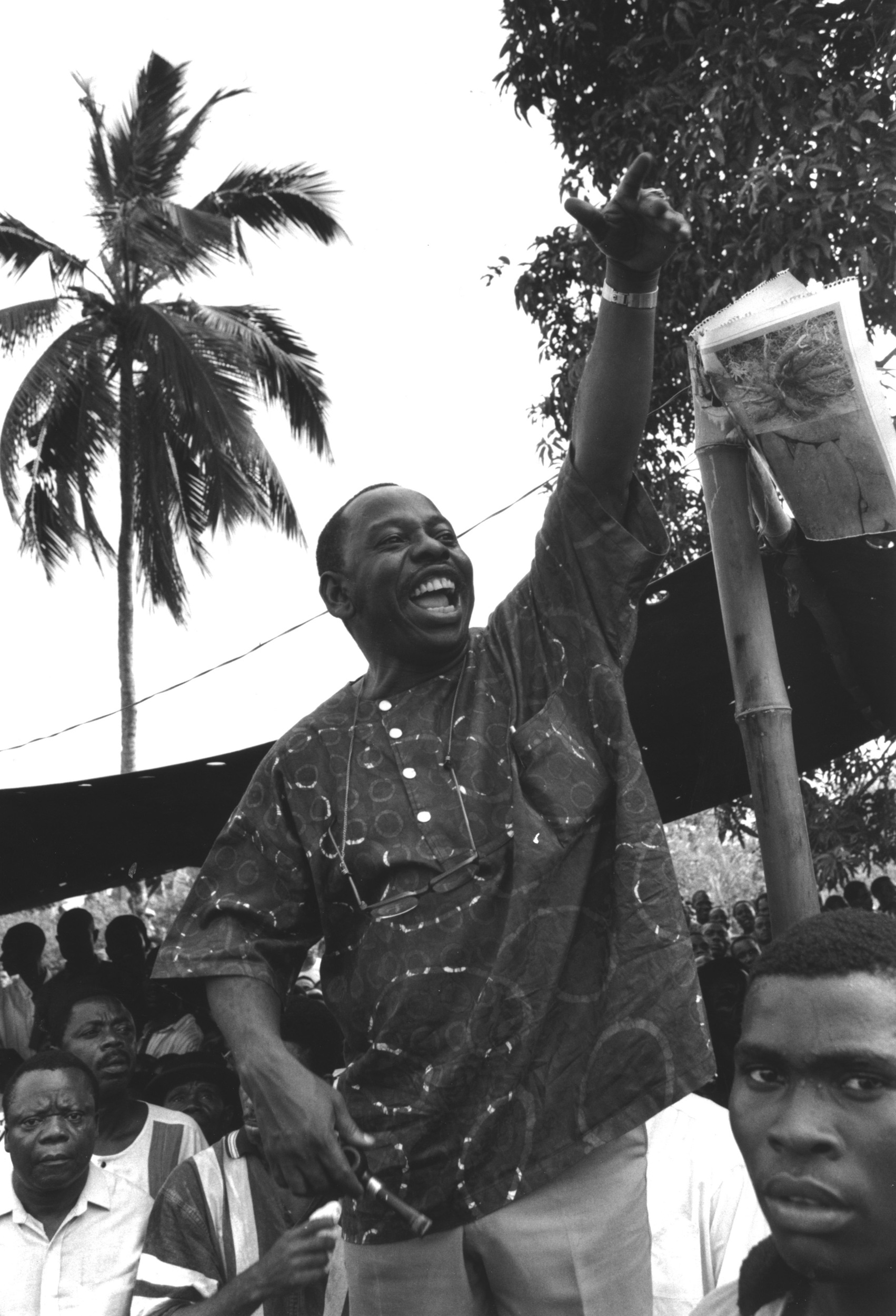
Ken Saro-Wiwa speaking at the Ogoni Day demonstration, Nigeria, in January 1993. Around 300,000 Ogoni people marched peacefully to draw attention to the plight of the Ogonis and the degradation of their land by Shell. Shell’s quest for oil in the Niger Delta, facilitated by the Nigerian government, resulted in decades of pollution, devastating the local community. © Tim Lambon / Greenpeace
Between 1976 and 1992, more than two million barrels of oil polluted Ogoniland, located in the Niger Delta, in 2,976 different oil spills. The spills have contaminated the Delta to such an extent that traditional Ogoni fishing and farming techniques are impossible. Today, it is reported that the rivers can no longer sustain marine life, and that crops which grow in the soil are overwhelmingly contaminated by carcinogens and toxins. While the Niger Delta is one of the ten most important wetland and coastal marine systems in the world, it is also the world’s most severely petroleum-impacted ecosystem.
Communities such as the Iko, Etche, Ogbia, and Uzure have been involved in long struggles for justice against the oil operation in the Delta. The most well-known example is that of the ‘Ogoni Nine’, who, after 20 years of protest, organisation and resistance, had their leaders falsely imprisoned and executed. Since 2002, Ogoni widower and human rights defender Esther Kiobel has been attempting to prove legal culpability for Shell’s responsibility in the execution of her husband. In March 2022, Kiobel lost her case. This is despite internal documents revealing that Shell had paid military generals and provided logistical support to armed forces during this period. Kiobel has vowed to continue her campaign for justice.
Now, more than a decade after being urged by the United Nations Environment Programme (UNEP) to clean up pollution in the Delta, restoration work has only begun on 11% of planned sites. Vast areas remain heavily contaminated. Billions of dollars in funding aimed at developing the Delta region have been lost over the past two decades. There is still a lack of decent roads, electricity and basic public services.
For decades, Shell and other oil companies in the region claimed that most spills in the region were caused by illegal tapping of pipelines and the theft of large quantities of oil by the local population. In 2013, Amnesty International USA investigated these claims, finding that there was no legitimate basis for claiming that sabotage and theft were the key producers of oil spills.
The criminalisation of Nigerian groups in the Delta feeds into racialised tropes of Black criminality. According to the UN, this is part of “a commonplace strategy that Government and corporate actors use to suppress and eliminate opposition to extractivist projects”.

Esther Kiobel has been campaigning for more than 20 years to prove that Shell colluded in the killing of her husband, Dr Barinem Kiobel, who was hanged as part of the ‘Ogoni Nine’ in 1995. She lost her civil case against the company in The Hague in March 2022. © Amnesty International
Lazarus Tamana is the president of the Movement for the Survival of Ogoni People (MOSOP), an Indigenous climate activist group in the Niger Delta. MOSOP was formed in the 1970s in response to Shell’s extractive oil operation in the region. The group was at the forefront of protests against Shell during the 1990s, and during this MOSOP’s leadership group, known as ‘the Ogoni Nine’ were falsely imprisoned and executed. Today the organisation continues to campaign against the destructive oil operation, and against the widespread pollution affecting the Delta.
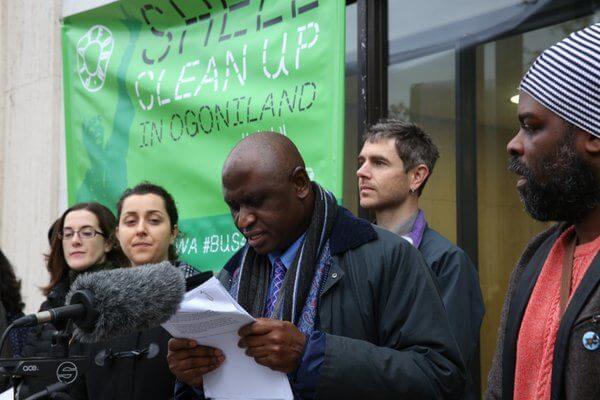
Lazarus Tamana, president of the Movement for the Survival of Ogoni People, reading at a vigil for the Ogoni nine at the Shell Centre, London, in 2015, to mark 20 years since their deaths. “In the court of public opinion the guilty corporation should not be left to hide from the truth of its political machinations and ecological apocalypse wrought upon the Ogoni and Niger Delta peoples and their land,” he said. © Platform
When interviewed for this report, Lazarus explained how MOSOP was formed and how the pollution in the Delta affects all of us:
Lazarus also describes Shell’s treatment of communities in the Delta, and its link to structural racism.
“The situation that [we] find ourselves in as a result of the oil spills and the impact is devastating; our life has been altered as a result of all these things over the years, and [this] continues to happen. Shell is not that particularly interested to address the issue, in terms of cleaning the environment for these people, for our people.”
“Shell’s oil operation was built on racism. It operates a double standard, compared to what they are doing in a place like the UK or Europe. Shell completely polluted Ogoniland and the Niger Delta without any sense of guilt. Shell does not care about the local communities in these places. These are voiceless people. They are powerless.”
“So there are no changes. There have been no changes whatsoever. Only surface level. Yes, we might think so, but deep down these have not changed.”
“What they want is to continue to make profits at the expense of communities who are powerless, communities who are voiceless like the communities in the Delta. And I don’t know when this is going to get better. Maybe it’s the day that we all die of extinction, that these operations will end. I hope something is done about it as soon as possible.
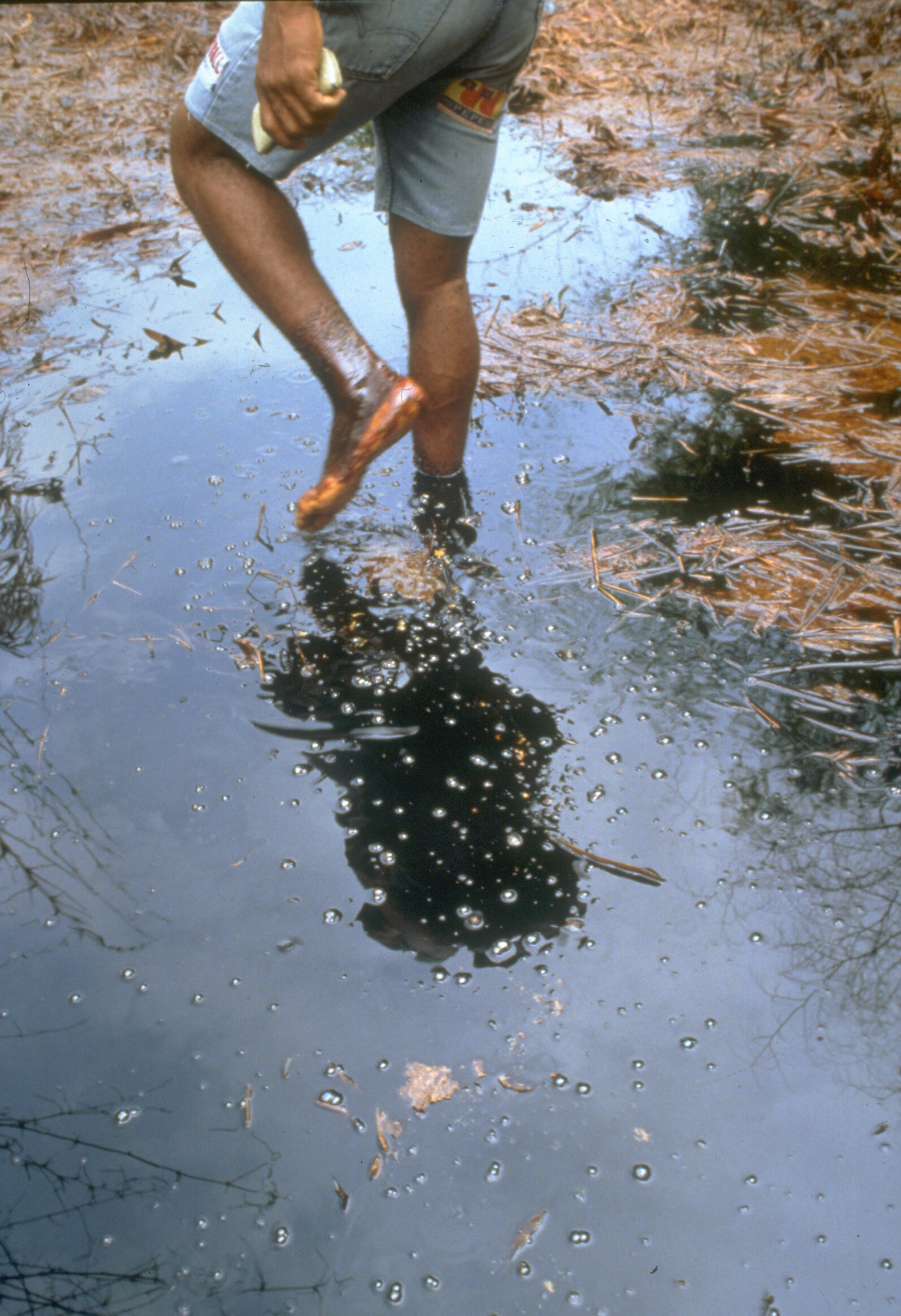
Leaking oil from Shell oilfields, Ogoniland, Nigeria, 1993. © Sara Leigh-Lewis / Greenpeace
The extraction of natural resources for profit has also had a devastating impact on Indigenous Communities in Brazil.
These communities are politically and socially marginalised as a result of racism from the Brazilian state and corporations. The Inter-American Commission on Human Rights found that concessions for extractivist projects by states are often approved in direct contravention of Indigenous Peoples’ and people of colour’s own concept of development.
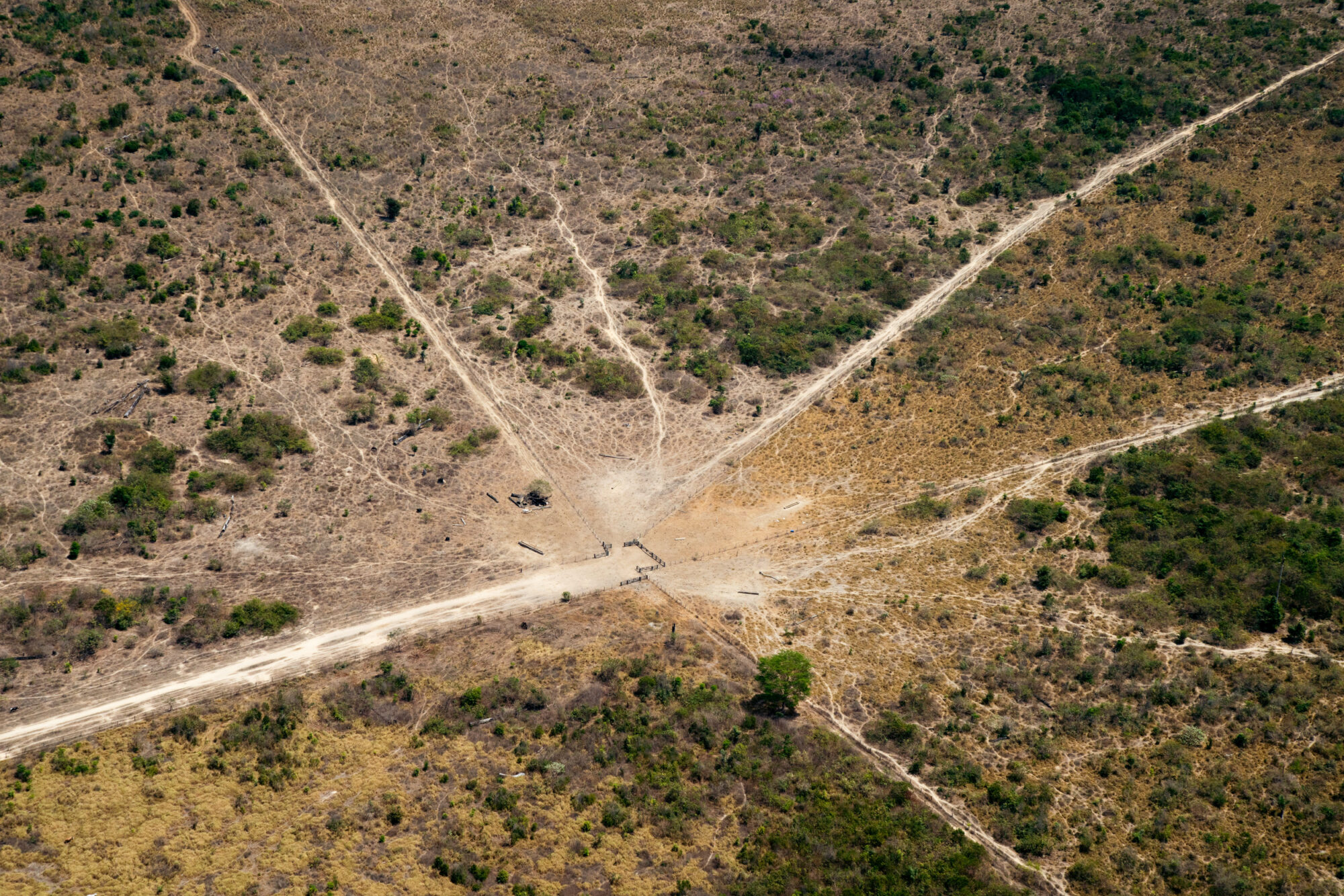
Cattle trails across Fazenda Santa Rosa in the Amazon, cleared through illegal burning. Cattle grazed on this farm may have supplied the nearby JBS slaughterhouse Santana do Araguaia in the state of Pará. © Christian Braga / Greenpeace
The products lining supermarket shelves in the UK are part of a global commodities trade destroying the forests of Brazil. This trade is a driver of the environmental emergency and perpetuates the oppression of Indigenous Peoples.
Since the arrival of European colonists, Brazil’s forests have suffered huge population and economic pressures, leading to high levels of deforestation. Brazil’s Amazon, for example, has lost about 18% of its forest cover in just the last 40 years – an area approximately the size of California. Recent research has revealed that the Brazilian Amazon has now switched from a carbon sink to a source, releasing 20% more carbon dioxide than it has absorbed in the past decade.
Pressure on the forest since colonial times has coincided with the decimation of the land and human rights of the Indigenous Peoples of Brazil. Estimates of the Indigenous population of Brazil at the beginning of the colonial period are between three and five million; by 2010, population figures had drastically reduced to just below 900,000. Of these people, 37% lived in cities as opposed to ancestral lands.
The genocide of Brazil’s Indigenous population is related to three significant waves of incursion into the Amazon since the territory became a Portuguese colony in the 16th century. The first of these is the period of post-discovery colonial occupation (1500-1800), followed by the large-scale extraction of non-timber products such as rubber from the mid-19th to mid-20th centuries. Since the mid-1960s, Brazil’s military dictatorship promoted significant expansion into the Amazon via infrastructure projects like road and dam-building as well as industrial cattle production. This model of creating a ‘development frontier’, which became the main driver of land-grabbing and other attacks on Indigenous Peoples, continued to the end of the 20th century, well after the military dictatorship was overthrown.
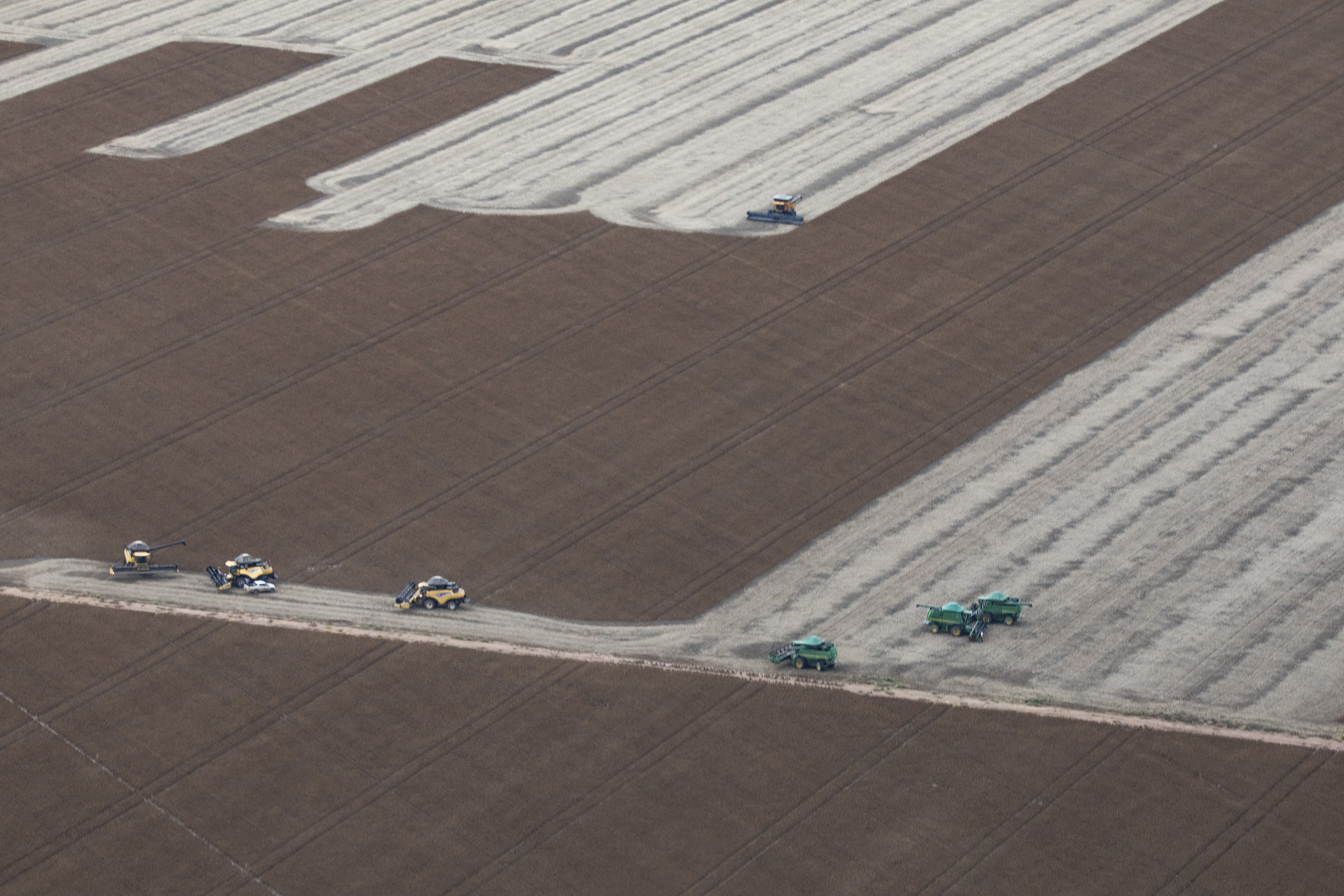
Soya being harvested in an embargoed area, where there shouldn’t be any plantation, inside the Estrondo Estate mega-farm. Brazil is the largest exporter of soya beans in the world, and soya bean cultivation has accelerated the deforestation of Brazilian biomes such as the Cerrado. © Victor Moriyama / Greenpeace
Whilst levels of Amazon destruction were significantly reduced in the early 2000s, deforestation has once again been increasing since financial recessions of the mid2010s, and more significantly under President Bolsonaro’s government. From August 2020 to July 2021, deforestation rose by 22%, hitting its highest level in over 15 years. Accompanying this has been the continued displacement of Indigenous Communities. Bolsonaro’s government is attempting to enshrine a so-called ‘death-package’ of bills which will allow further commercial activities and infringement of Indigenous rights in vulnerable areas, removing previous protections. These attacks on the rights of Indigenous Peoples are often justified through racist descriptions of them being ‘undeveloped’. For example, in 2018, Bolsonaro mirrored colonial-era racism by comparing Indigenous Communities living in reserves to “animals in a zoo”.
The milk in the refrigerator aisle of your local Asda is supplied by the multinational food company Arla. Before it makes its way onto supermarket shelves, Arla purchases milk from industrial British dairy farms in the Cornish countryside. Given the scale of production on these farms, livestock are permanently housed rather than allowed to graze. Their diets have therefore shifted away from grass and food waste and onto grain and protein-based feed, including soya.
This soya-based feed is provided by a host of suppliers buying from soya-exporting countries, including Brazil, where it is predominantly grown in the Cerrado region, a biodiversity-rich savannah forest. The biggest direct importer to these suppliers is America’s largest private company, food giant Cargill.
Cargill is a top exporter of Brazilian soya and one of the top three meat packers globally. The food giant has been repeatedly linked to deforestation and to soya producing ranches linked to human rights abuses in Brazil. More than a decade ago, Cargill announced it would end deforestation in its supply chains by 2020. It recently admitted it missed that deadline and set a new target for 2030, paving the way for another decade of destruction.
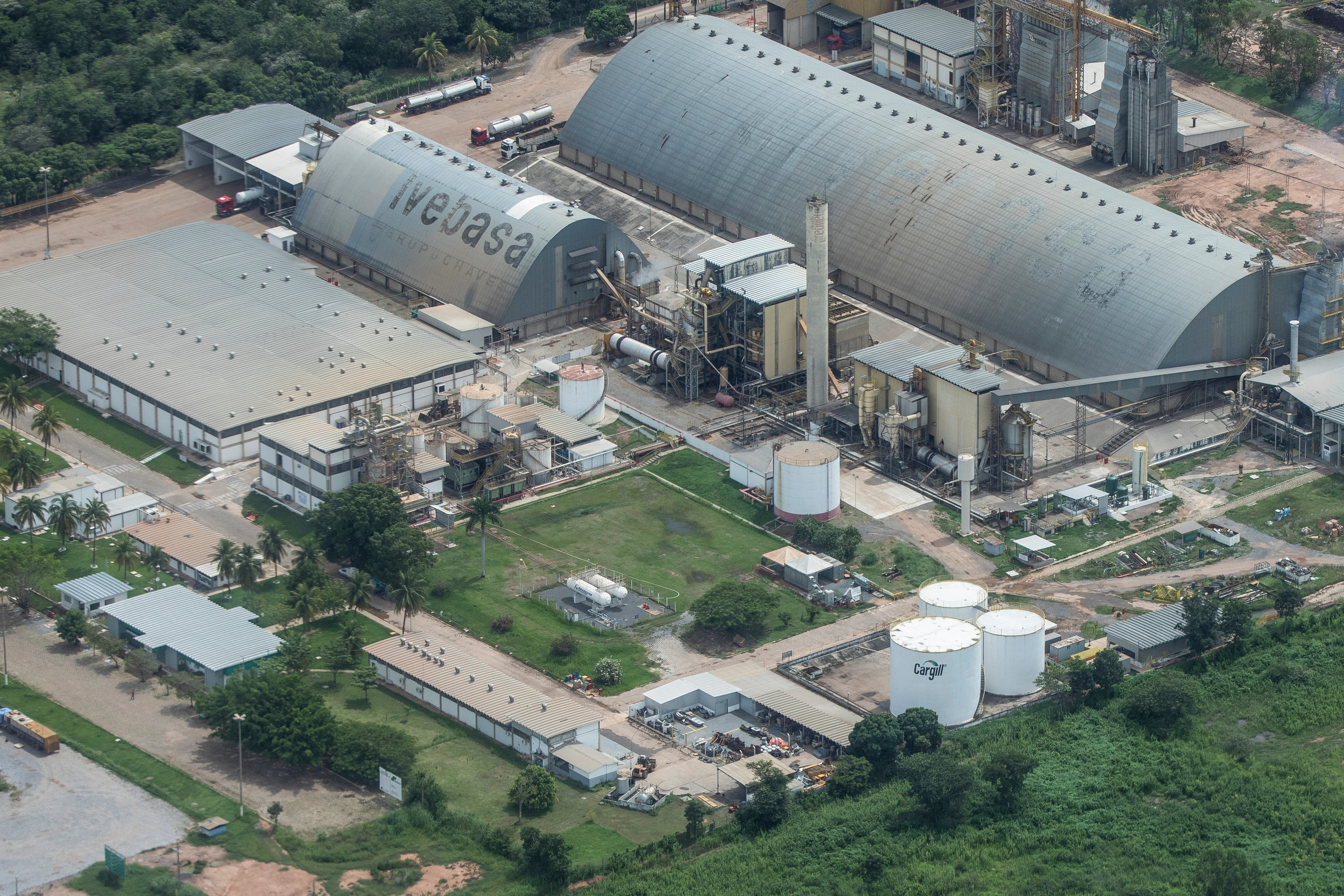
Cargill Soya Processing Center in Barreiras, Bahia State, Brazil. © Victor Moriyama / Greenpeace
The UK imports roughly 3.2 million tonnes of soya each year, around 75% of which is used to feed cows, chickens and pigs. This annual demand for soya needs an area of land in South America larger than the whole of Northern Ireland to be deforested and occupied by soya plantations.
Cargill is a top soya-fed chicken supplier, operating out of Hereford in the UK. Besides Cargill, the British poultry sector is also controlled by one of the world’s most notorious forest destroyers, Brazilian-owned JBS, the world’s largest meat-packing company. Its UK subsidiaries include Moy Park and Pilgrim’s Pride. Because of its ever growing beef production in Brazil, JBS has regularly been associated with land-grabbing, deforestation and encroachment on Indigenous lands.
In 2019, it was discovered that nearly £1 billion worth of beef supplies by JBS and its Brazilian competitors, slaughterhouses Marfrig and Minerva, were directly imported into the UK. Products in this supply chain can be found on the shelves in Sainsbury’s, Morrisons, Aldi, Lidl and Asda. But it is not only supermarkets that are implicated. The NHS supply chain has also been supplied Brazilian beef through an umbrella company of JBS.
The world’s largest agricultural companies, like Cargill and JBS, benefit significantly from the trade in global commodities with its roots in colonialism – a system which produces vast profits for them. This comes at the expense of the lives and livelihoods of Indigenous Communities in Brazil and across South America, and the consequences for the climate emergency are dramatic.
Leaving land under the care of Indigenous Communities, rather than at the mercy of industrial agriculture, is a proven way to effectively protect biodiversity. Systems of locally empowered environmental stewardship recognise that Indigenous Peoples’ wellbeing is bound to ownership over traditional lands. Complex ecosystems have been sustainably managed and regenerated by these communities for generations, and maintaining biodiversity is important for all life on Earth.
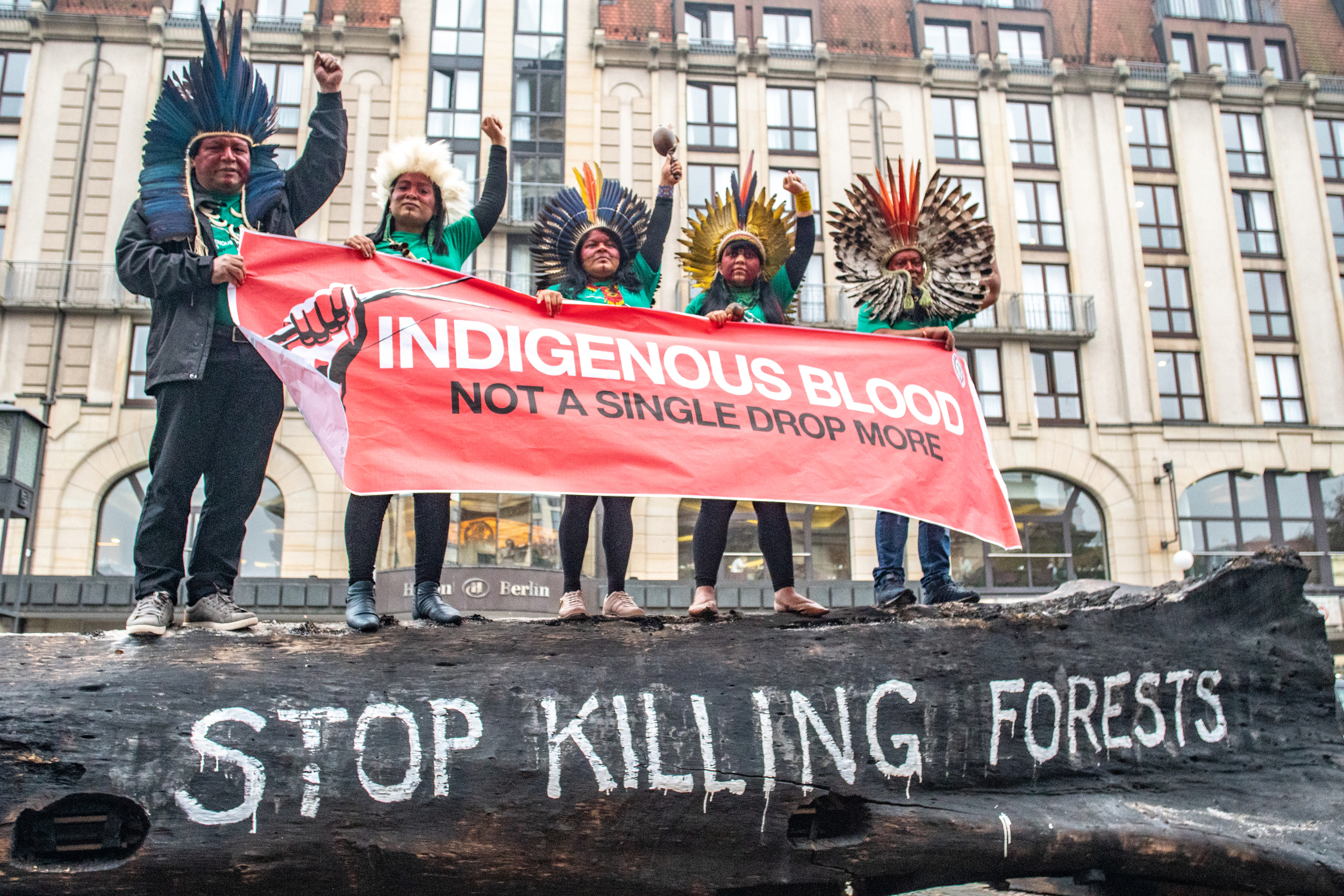
Indigenous leaders from Brazil demonstrate at the Consumer Goods Forum (CGF) Sustainability Committee Meeting in Berlin, 2019, against some of the world’s biggest brands, including Nestlé and Unilever, to demand they end their role in forest destruction in the Amazon and across Brazil. © Midia NINJA
Indigenous activists in Brazil, such as Sonia Guajajara, have been advocating this message for decades. In a 2020 speech to accept the Letelier-Moffitt Human Rights Award on behalf of the Association of Indigenous Peoples of Brazil (APIB), Guajajara said:
“Indigenous peoples are protecting the Amazon rainforest against a genocidal government that values the profits of international corporations at the expense of life – often our own lives….
…Through our collective resistance, APIB defends the right of everyone around the world to exist outside this exploitative economic system. That is why we, indigenous peoples and members of APIB, continue to resist and build strategies to expose governments like Bolsonaro’s, agribusiness, mining and energy companies operating in Brazil…
…All of them are complicit in the destruction of the Amazon, the heart of the world, and in the subsequent human rights violations. Together, they are condemning life on this planet.
Protecting the Amazon is vital for the protection of life on Earth. By defending the Amazon rainforest, and the territories, cultures, and lives of indigenous peoples, APIB is also defending the right to life everywhere.”
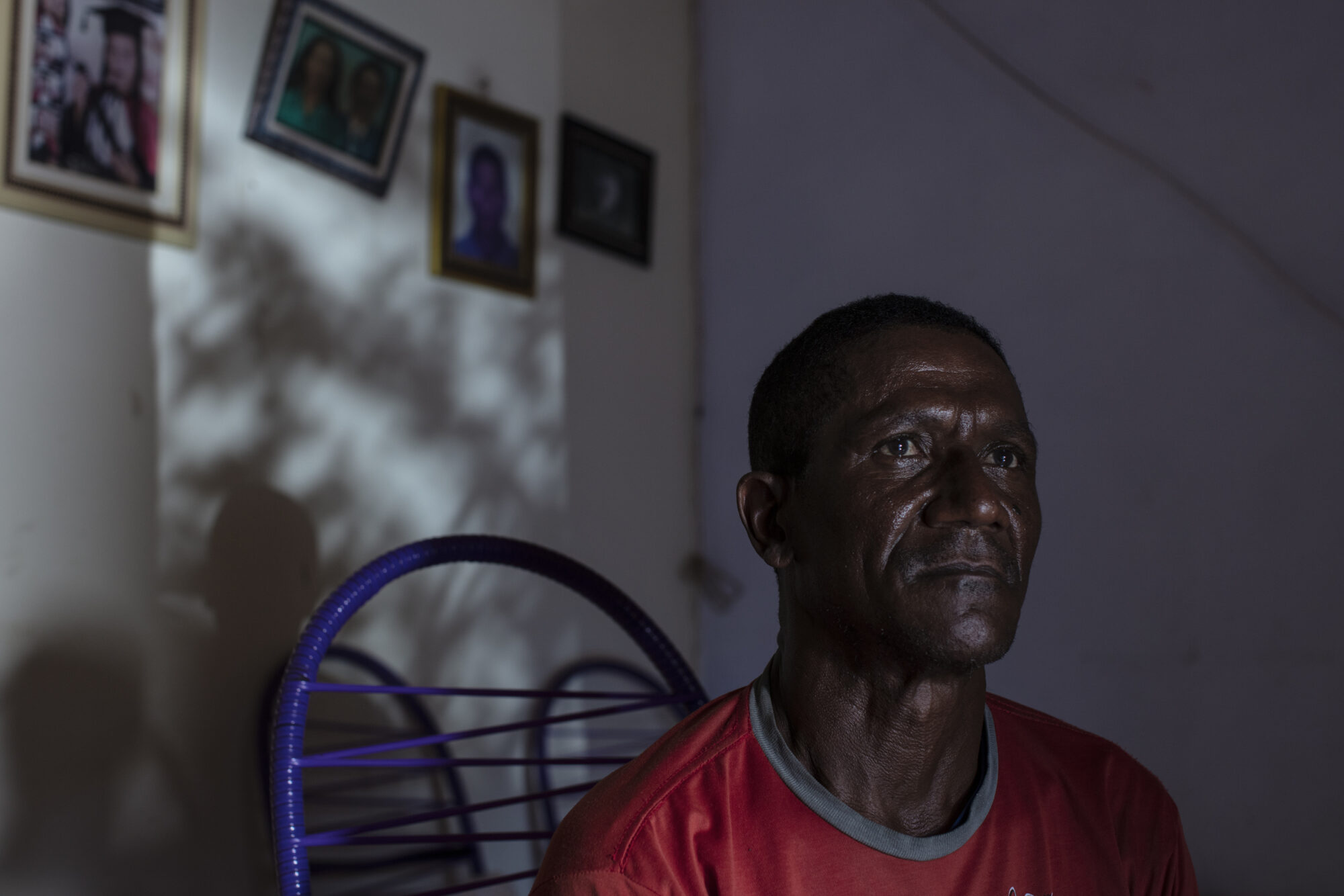
Adão Batista Gomes, a Cachoeira community resident, describes living in fear of the private security guards contracted by the Estrondo Estate to prevent access by the community residents to an area in judicial dispute: "The lives of community residents have changed a lot. I'm even neglecting to take care of my things, the animals, because I avoid walking alone in the countryside. I'm even afraid of what they can do to us." © Marizilda Cruppe / Greenpeace
Deforestation in Brazil is happening at an ever increasing rate. There are, however, communities who continue to organise against and resist against the exploitative practices of international agribusiness. One such example is the Geraizeiros community, who have been defending their rights over land against the expansion of soya-producing farms.
The Estrondo Estate is a mega-farm located in the soya frontier of Bahia, within the devastated Cerrado biome, the world’s most biodiverse savanna and often referred to as Brazil’s water tank. Cargill has grain silos on the estate, and from there it has historically exported soya to Europe and China for use in commercial animal feed, such as that which feeds Arla’s dairy cows.
Estrondo has gained notoriety for land grabbing from Indigenous Geraizeira communities and for incidences of illegal deforestation. Since 2000, well over one-third of the Estrondo’s estate has been cleared to make space for plantation – including the deforestation of 49,000 hectares of land using fraudulently obtained permits. The estate has been accused of labour exploitation on several of its farms. This includes the 2005 discovery of 39 workers working in slavery-like conditions on the soya-producing Austrália farm.
It is widely recognised that the estate was founded on a land grab. Deforestation by the Estrondo Estate exposes local Indigenous Communities directly to the effects of the climate crisis. Witness testimony from Romulo Batista, Greenpeace Brazil, in partnership with the Geraizeiros community has reported:
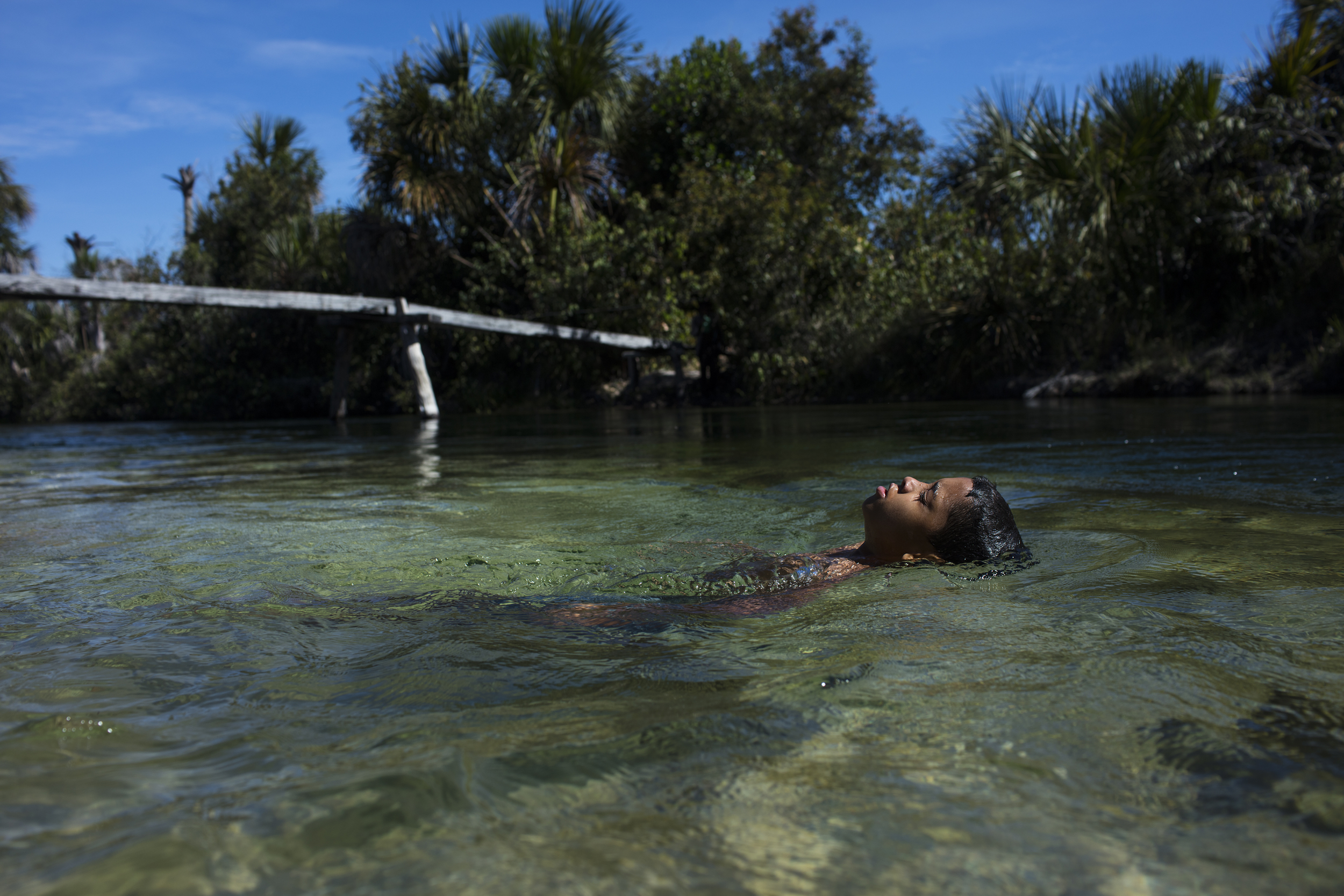
The Cerrado biome is a diverse and vast tropical savanna ecoregion of Brazil. It contains forests, plains, savannas and a huge amount of natural resources. For centuries, local populations have been living in the region without destroying the natural landscape, while depending on it for their livelihood.The expansion of agribusiness is risking its survival and the availability of natural resources, causing conflicts over land and even water. © Marizilda Cruppe / Greenpeace
The estate is also built on lands to which the land use rights of the Geraizeria communities have been legally recognised, who, with the support of charities within Brazil, have been fighting for over a decade against the illegal practices of the Estrondo Estate.
In 2008, a network of Indigenous groups in approximately 100 Indigeneous lands came together to form The Mobilisation of Indigenous People of the Cerrado (MOPIC). In 2014, MOPIC and other Indigenous groups met with public officials and civil society groups in Bahia State at the Seventh Meeting and Fair of the peoples of the Cerrado. The fair was organised to promote interaction between local communities and the public prosecutor’s office – which had been investigating Estrondo’s land-grabbing activities since 2007.
Together with these groups, the Geraizeiros initiated a collective legal action to recognise community lands. In 2017, this led to a court injunction which recognised 43,00 hectares as belonging to the Geraizeiros. The injunction has not been respected by the Estrondo Estate, which up until 2019 allegedly worked with corrupt local judges to reduce the area granted to the Geraizeiros.
In 2019, the decision to grant land to the Geraizeiros was confirmed. However, since this date, it has been reported that Estrondo has increased its campaign of aggression against the Geraizeiros. In 2022, local Geraizeira communities reported the use of a land clearance technique in these areas known as correntão (big chain). The technique requires attaching a chain between two tractors and dragging it across the ground – vegetation, trees and animals are all equally left in its wake. Analysis of satellite imagery shows that between November 2021 and May 2022, correntão cleared some 24,000 hectares within the boundaries of the estate – that is an area the size of Frankfurt lost in just four months.
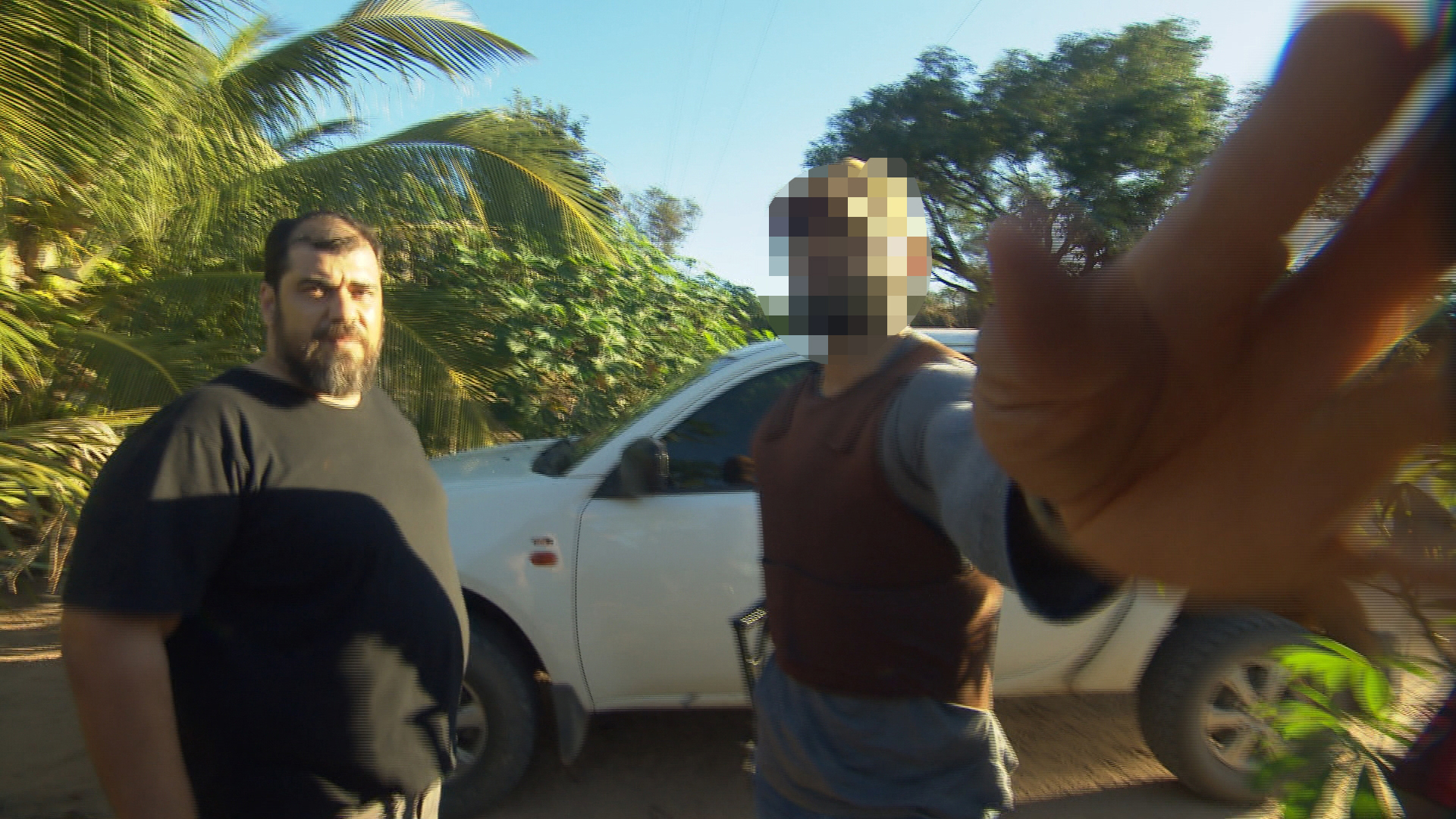
An armed man confronts Greenpeace Brazil staff during a raid on a local community in the Estrondo Estate in 2019. Despite court rulings supporting their land rights, communities all over the Cerrado have have faced violence and intimidation as agribusiness expanded across the region. © Greenpeace
Between 2019 and 2022, Romulo Batista has witnessed several violent acts perpetrated against the Geraizeiros by the Estrondo estate, and by private security forces who are connected to the mega-farm.
Batista reports:
On the west coast of Africa, extractive fishing industries owned by powerful high-income states and companies are plundering natural resources at the expense of the local community. As in Brazil, UK supply chains have a fundamental role in the industries damaging the lives and livelihoods of communities in Senegal and Mauritania. Today, hundreds of thousands of tonnes of fresh fish which could be used for feeding food-insecure populations on the west coast of Africa, are instead being processed into fishmeal and fish oil. This is used in the production of farmed fish such as salmon and trout, whilst a high proportion (23%) is used in pig feed for the agricultural sector.
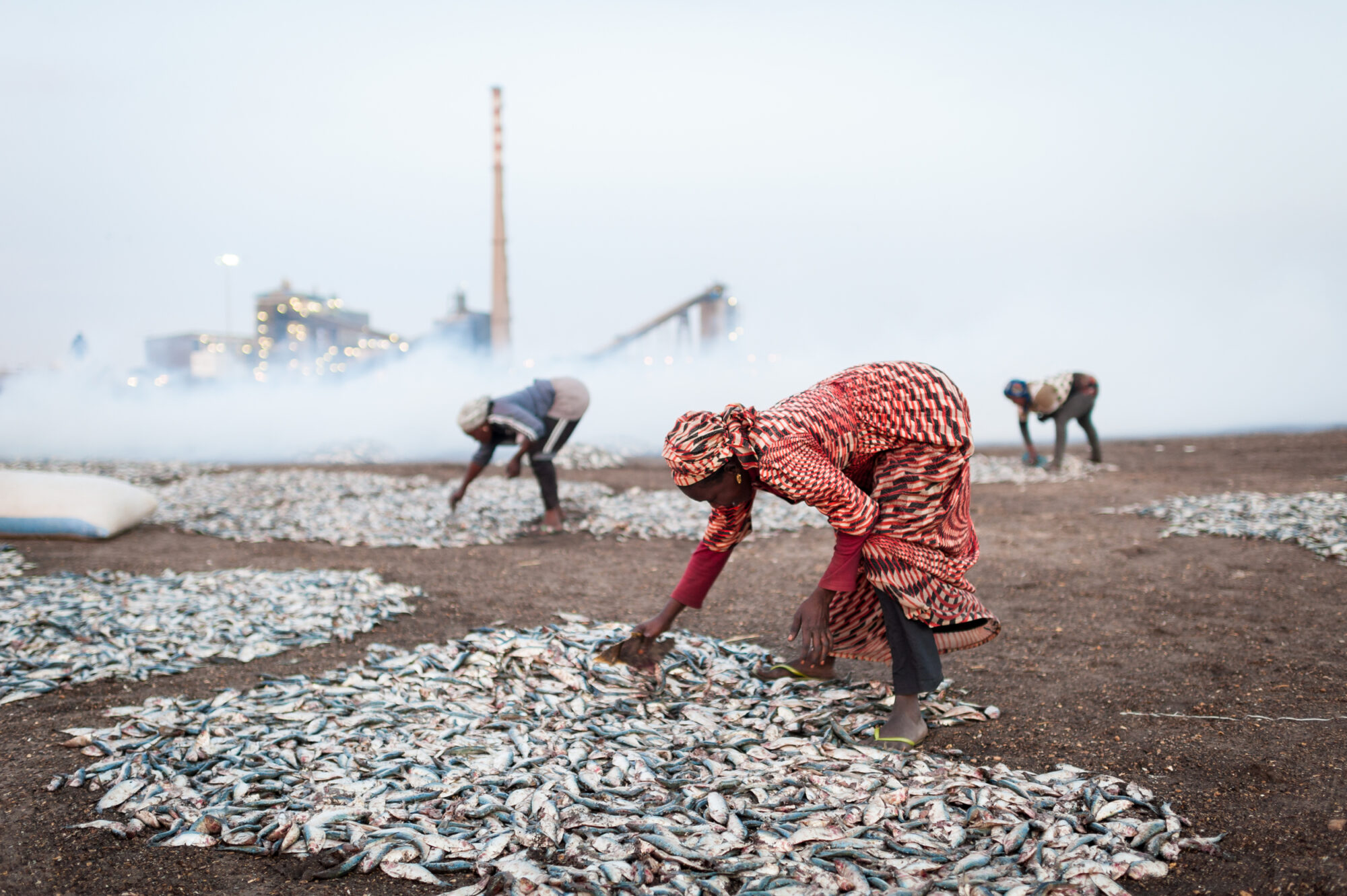
Fatou Samba, a fish processor, leader and activist, smoking fish in Bargny, a fishing community near Dakar, Senegal. Local women processors are struggling to maintain their livelihoods following the installation of fishmeal and f ish oil factories in local fishing communities. © Clément Tardif / Greenpeace
Overfishing in places like the Mediterranean and North Atlantic, combined with a corporate pursuit of bigger profit margins, has drained fish stock levels and led to an increase in distant water fishing boats arriving off the coast of West and Central Africa. As a result, fishers and fishing processors all over West Africa are struggling to make ends meet following decades of increased pressure on their local fishing stocks from foreign industrial fishing fleets. This industry consists mostly of Chinese, Turkish, Russian and European companies who are leaving behind an increasingly empty ocean.
The United Nations Convention of the Law of the Sea (UNCLOS), is the foundation upon which the entire current distant water fishing industry is based. The Convention is exploited by foreign fishing countries to negotiate and purchase fishing access to other countries’ coastal waters. Wealthier nations, including Spain and China, have been taking advantage of the competing developmental priorities of African nations by trading assurances of aid or infrastructure projects for fishing licences, which are priced far below the value of the fish.
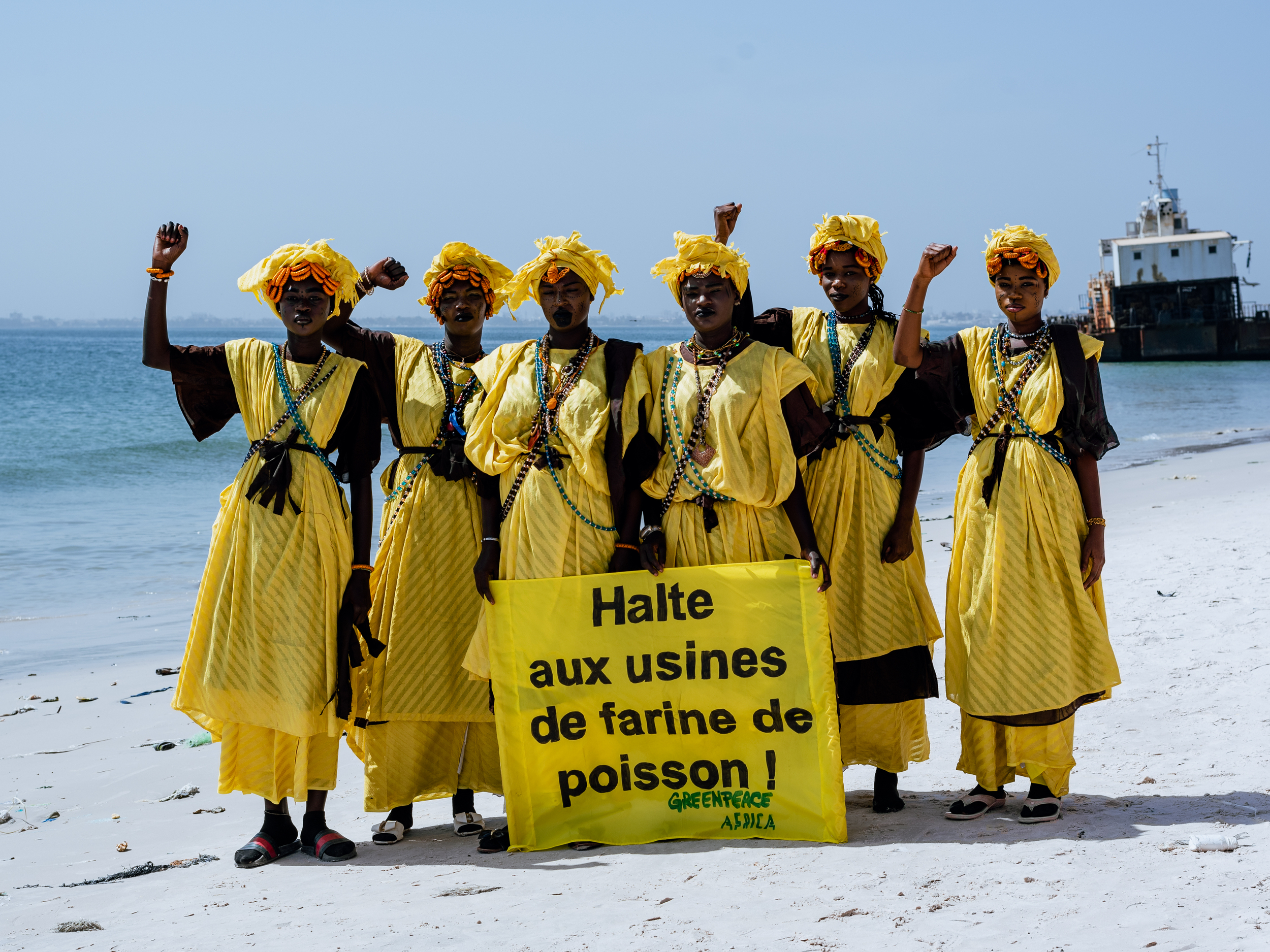
Almost 1000 women fish processors, community leaders and civil society organisation representatives from all over Senegal celebrate World Fisheries Day in 2021. Greenpeace Africa demands that the Senegalese government ends the fishmeal industry and stops granting new fishing licences, and instead supports women processors and fishing communities, to protect the ocean and to ensure people’s food security. © Omar Bayo Fall / Greenpeace
One of the most common ways in which foreign countries access local fisheries in West Africa is through ‘joint venture agreements’ or by establishing ‘joint venture companies’. Under these agreements, there is sometimes an expectation that the foreign nation will help to train and develop local fishing companies. In truth, however, these agreements result in chronic overfishing for export markets and in very low revenue streams for the host country, leaving it without either money or resources. The trade is depriving local communities of both their livelihoods and food security.
Seventy percent of the animal protein consumed in Senegal comes from fish. Instead of meeting local needs, local fish stocks are being extracted and processed into fishmeal and fish oil. These products are then exported, ready to be used in the aquaculture, cosmetics and pet care industries of Europe and Asia. Once fish has been processed into fish oil, it becomes another global commodity: added to Brazilian soymeal, used to feed salmon in Norway, used for pig feed in Denmark or taken as dietary supplements by Western consumers.
The fishmeal and fish oil industry dominates the fishing sector in West Africa, and, as a result, highly skilled female fish processors who have historically processed fish for human consumption are facing increasing difficulty finding work in local markets. Here, demand is comparatively limited and the quality of fish is lower. Female fish processors are almost entirely excluded from the wider economy, and are also locked out of virtually every segment of the fisheries sector. They are unable to compete with wealthy wholesalers, who sell their products to processing plants, ready to be used in the fishmeal and fish oil industry.
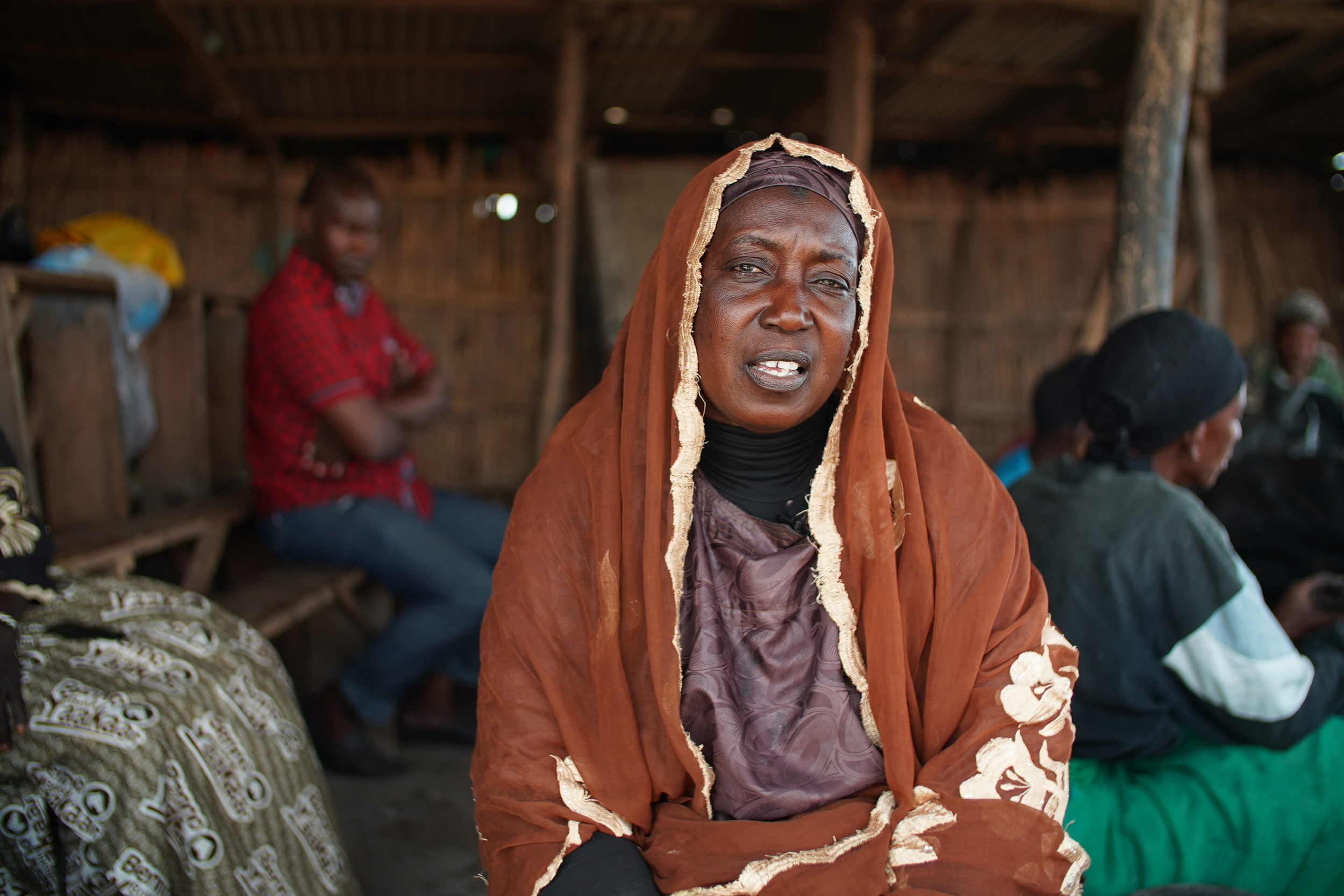
Maimouna Sabaly, fish processor and activist in Senegal, has witnessed the damage caused by the fishmeal and fish oil industry first hand. © Julien Flosse / Greenpeace
Maimouna Sabaly is a local activist in Senegal. She has been a fish processor for more than 30 years, and has witnessed the damage caused by the fishmeal and fish oil industry first hand. In 2022, she told a team of Greenpeace Africa researchers:
“Our conditions are very, very difficult right now. We can no longer do our jobs. We just have to hold on to the little work that we have left.”
“The harm that the fishmeal factories are doing is enormous. They have come and increased the price of fish to such a very high price that we fish processors can no longer even buy the fish to process. On top of that, the factories give off fumes that harm our health. The smoke that fishmeal factories give off is terrible, and many people have fallen ill because of these fumes. Not only do we need more fish if we’re going to be able to do our jobs, but we’re always getting sick because of the smoke that these factories give off. They have destroyed our environment. This continues because our leaders simply refuse to listen.”
In Senegal, 59% of fish oil is exported to the EU. In 2019 alone, more than 70% of fish oil exported from Mauritania was also destined for European markets. In this period just four multinational corporations commanded the trade, including Cargill Aqua Nutrition, whose parent company is also heavily involved in the destructive soya trade in Brazil. The four leading European companies involved in the fishmeal and fish oil trade reported combined sales worth US$3.3 billion. Meanwhile, communities in West Africa are suffering from ill-health related to pollution, and from food insecurity. In 2019, 17% (2.2 million people) of the population of Senegal was reported to be experiencing acute or severe food insecurity. In Mauritania the figure was 43% (1.8 million people).
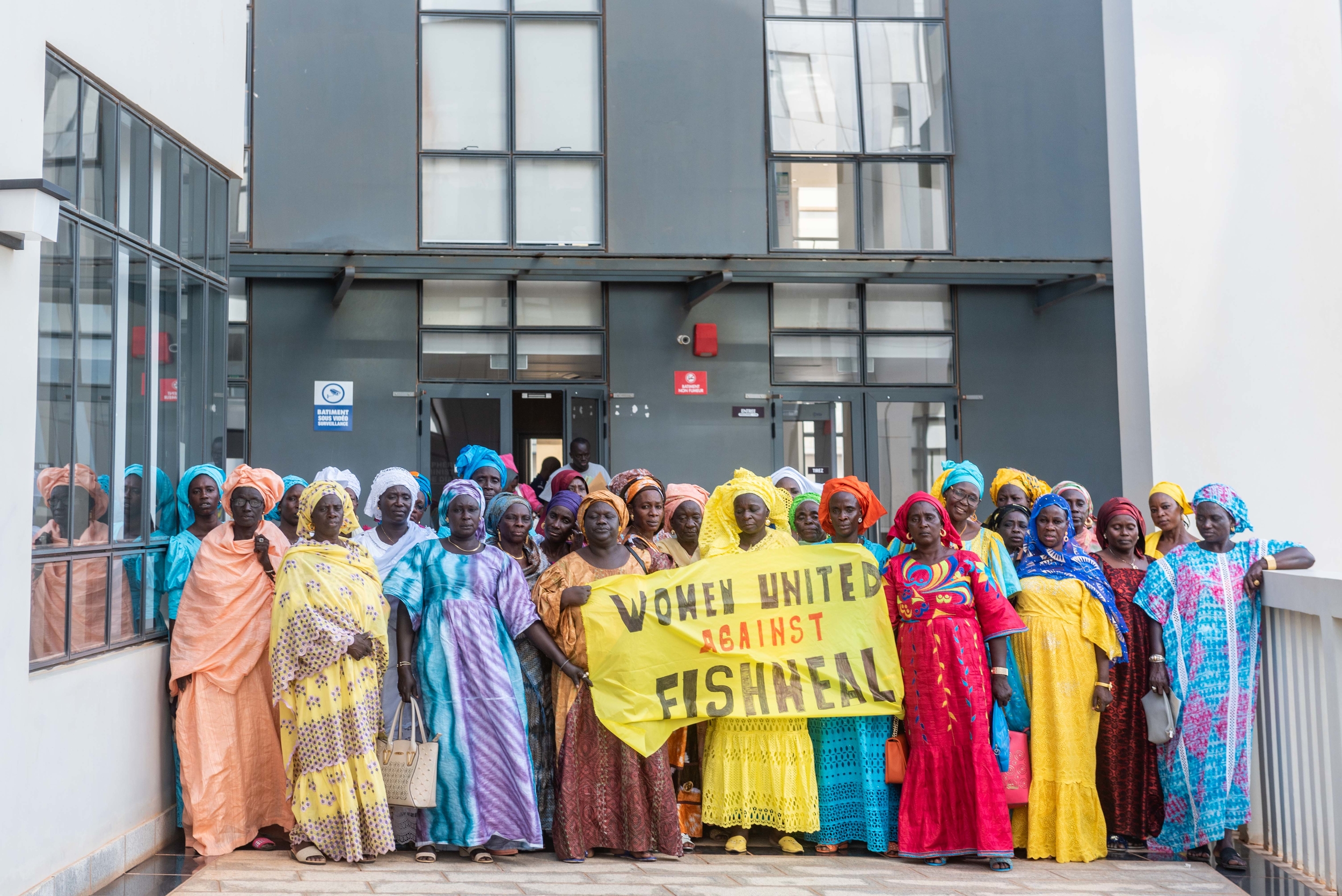
Senegalese women fish processors outside the Fisheries Minister’s offices, Dakar, September 2019, after a meeting to present their demands to the authorities to stop fishmeal and fish oil production in West Africa. © Pape Diatta Sarr / Greenpeace
Local fishing communities have few natural resources available in their waters and are in an unequal fight against foreign fishing enterprises. There has, however, been organised resistance to the extractive economies taking place in these countries. For the past 10 years, the Pan Africanist group The African Confederation of Artisanal Fishing Organisations (CAOPA) has been advocating for the rights of artisanal fishing communities in Africa.
In 2014, CAOPA celebrated the first International Women’s Day in Cote d’Ivoire by bringing together women from 16 African countries, including in Mauritania, to publicly spotlight their roles within the fishing sector. This event initiated a long campaign for legal recognition of the profession of fish processing across Africa.
In 2018, COAPA began dialogues with the governments of Cote d’Ivoire, Guinea and Senegal to develop national action plans to promote sustainable artisanal fisheries, which promote food security and fair working conditions. In a declaration for World Fisheries Day, COAPA stated: “the beating heart of Africa’s blue economy is artisanal fisheries that feed our people”.
The dumping of toxic or hazardous waste pollutants is concentrated in ‘sacrifice zones’ or occupied predominantly by low income people of colour across the globe. Communities impacted in the global South have fewer political and economic solutions to mount effective opposition to potentially hazardous waste sites and practices.
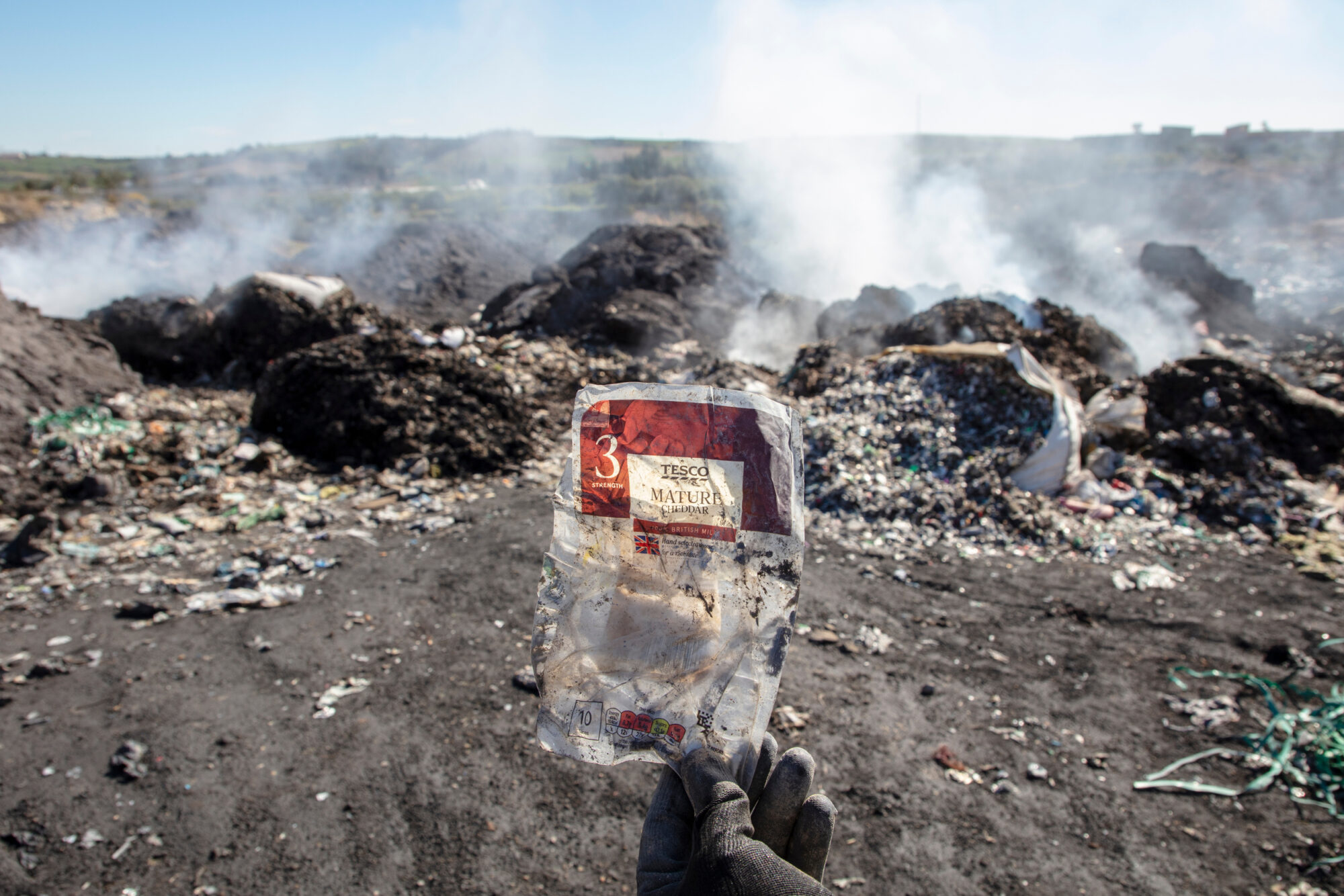
A Greenpeace investigations team locates plastic packaging from UK, German and global food and drinks brands and supermarkets in a waste dump at Karahan Kuyumcular, a village in Adana Province, Turkey, in 2021. 210,000 tonnes of plastic waste was exported from the UK to Turkey in 2020. © Caner Ozkan / Greenpeace
The UK currently exports well over half of the plastic waste that the UK government counts as ‘recycled’. The result of this is that these materials actually end up overseas, with the responsibility of dealing with this waste now pushed onto other countries. In many of these countries, particularly those in the global South, this compounds an already deadly problem of plastic pollution, which has lasting environmental, and social consequences.
Every year, it is estimated that between 400,000 and one million people die in the global South because of diseases related to waste and plastic pollution – this equates to up to one person every 30 seconds. Plastic waste contains many toxic substances, such as flame retardants, plasticisers and stabilisers. When incinerated or burned, this waste harms people’s health by creating respiratory ailments and increasing the risk of heart disease and cancer.
These build-ups of dangerous waste are being created in part by the exportation of waste from the global North. The UK is the second largest producer of plastic waste per capita in the world. Greenpeace analysis of UK government trade data showed that, in 2020, it exported 688,000 tonnes of plastic waste out to other countries.
Almost 40% of this, amounting to 210,000 tonnes in 2020, ended up in Turkey, a country with very low recycling rates and a serious problem with waste dumping and burning, piling into huge mountains of rubbish and left to spill into the rivers and the sea. This lack of waste management infrastructure has resulted in widespread plastic leakage into the Mediterranean Sea. The microplastics produced by this plastic waste are mixing with groundwater, air and soil. The health problems this causes further compound the existing health issues many in these already impoverished areas face, leaving them “unable to cope”, according to Umut Özşimşek, a youth activist in Turkey campaigning against the plastic waste trade as part of a youth led movement called Children of Nature.
Children of Nature is resisting the toxic waste colonialism Turkey has been subjecting its people to, by demanding an end to all imported garbage. The movement is also calling for proper recycling and inspection facilities to be established to address the current inflow of plastic waste, as well as pushing for stronger repercussions for those who do not adhere to these guidelines. The movement believes that this is a universal struggle, as the “garbage being burned in Turkey today will continue to be burned elsewhere tomorrow for the benefit of a few countries and people”.
The links between systemic racism and the environmental emergency are also evident in the exploitation and exclusion of experts, leaders and activists from impacted communities across the global South through initiatives which claim to mitigate the environmental emergency. This includes the dispossession of land in the global South to ‘offset’ carbon emissions, establish conservation reserves and build green technology.
Corporations, increasingly concerned with net zero targets, have released plans to offset their emissions by paying for others to absorb carbon dioxide. For example, British multinational oil and gas company BP runs a ‘Target Neutral’ programme, which aims to reduce its customers’ carbon footprint by funding projects to reduce carbon dioxide in the global South.
The majority of land available to facilitate carbon offsetting is in global South countries, which can result in land grabbing, human rights abuses and forced evictions. The Oakland Institute investigated plantation forestry in 2014 and found that a privately owned Norwegian company implementing forestry-based carbon offset projects forced evictions and restricted access to land and food for communities in Uganda. Green Resources has leased more than 10,000 hectares of land in East Africa, and in doing so has devastated communities who were evicted as a result.
“The majority of land available to facilitate carbon offsetting is in global South countries, which can result in land grabbing, human rights abuses and forced evictions.”
Olufemi O. Táíwò, Assistant Professor of Philosophy at Georgetown University, highlights a danger facing environmental movements in the global North. He emphasises that progressive climate movements cannot work towards climate justice if they support policies that have oppressed people. Efforts to boost energy security can have a role in driving “climate colonialism”, which “includes the expansion of foreign domination by initiatives that respond to climate change.” Taiwo says, “Environmentalist groups based in the global North… working alongside groups based in the global South, is a good start for a basic kind of blueprint for how to avoid contributing to climate colonialism.”
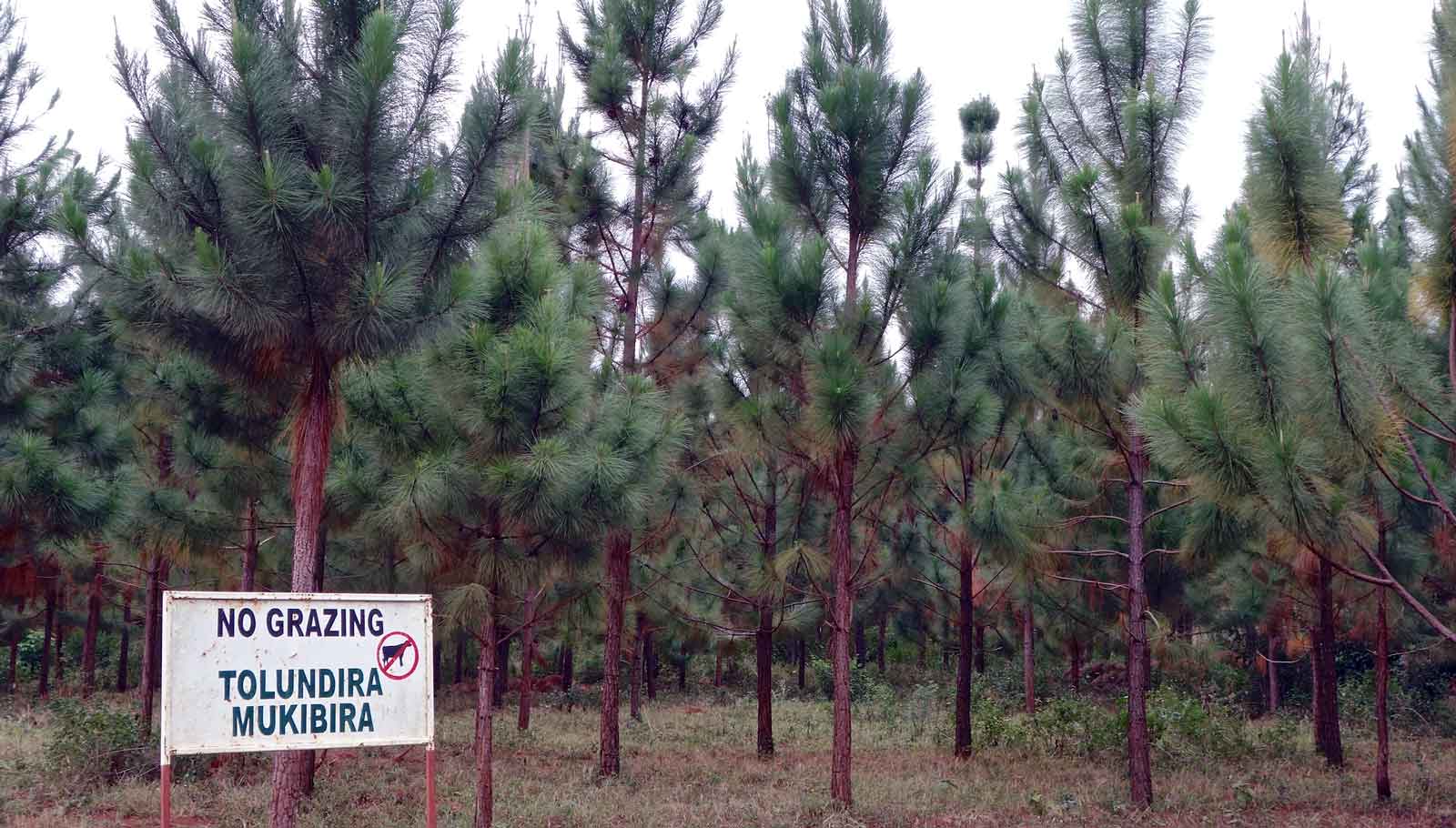
A Green Resources plantation in Bukaleba, Uganda. The privately owned Norwegian carbon offsetting company has forced evictions and restricted access to land and food for communities in Uganda. © Kristen Lyons / The Oakland Institute
How systemic and environmental racism disproportionately harms people of colour in the UK
In both the global North and in the global South, people of colour and low-income communities who have contributed least to the environmental emergency are among those who face the worst of its impacts.
In the UK, there is evidence that systemic racism has led to people of colour being disproportionately more likely to be concentrated in low-paid, precarious jobs and live in poorer areas most impacted by environmental disadvantage. People of colour are also more likely to be at the forefront of the cost of living crisis, a crisis created in part by the extractive economy.
The extraction of natural resources for sale on the global market by companies like Shell is fuelling the environmental emergency. It is also contributing to the worst cost of living crisis in 50 years in the UK. In both the global North and the global South, people of colour are disproportionately impacted.
A rapid increase in energy costs from early 2021, in particular the wholesale price of gas, is a major contributor to the cost of living crisis. Nearly 80% of households in England are heated by mains gas, and one third of electricity is generated in gas power stations.
These rising costs translate to a 5.4% (£693) increase in the energy price cap for most consumers. Charities have warned that the price increase could leave over six million UK households in fuel poverty.
This increase in energy costs is likely to hit Black and ethnic minority households harder. In the two years to March 2021, an average of 12.6% of white households were experiencing fuel poverty compared to 19.1% for Black and ethnic minority households.
After paying for housing costs, more than half (55%) of Bangladeshi and 47% of Pakistani households experience poverty. For Black African, Black Caribbean and Black British households, the rate is 40%.
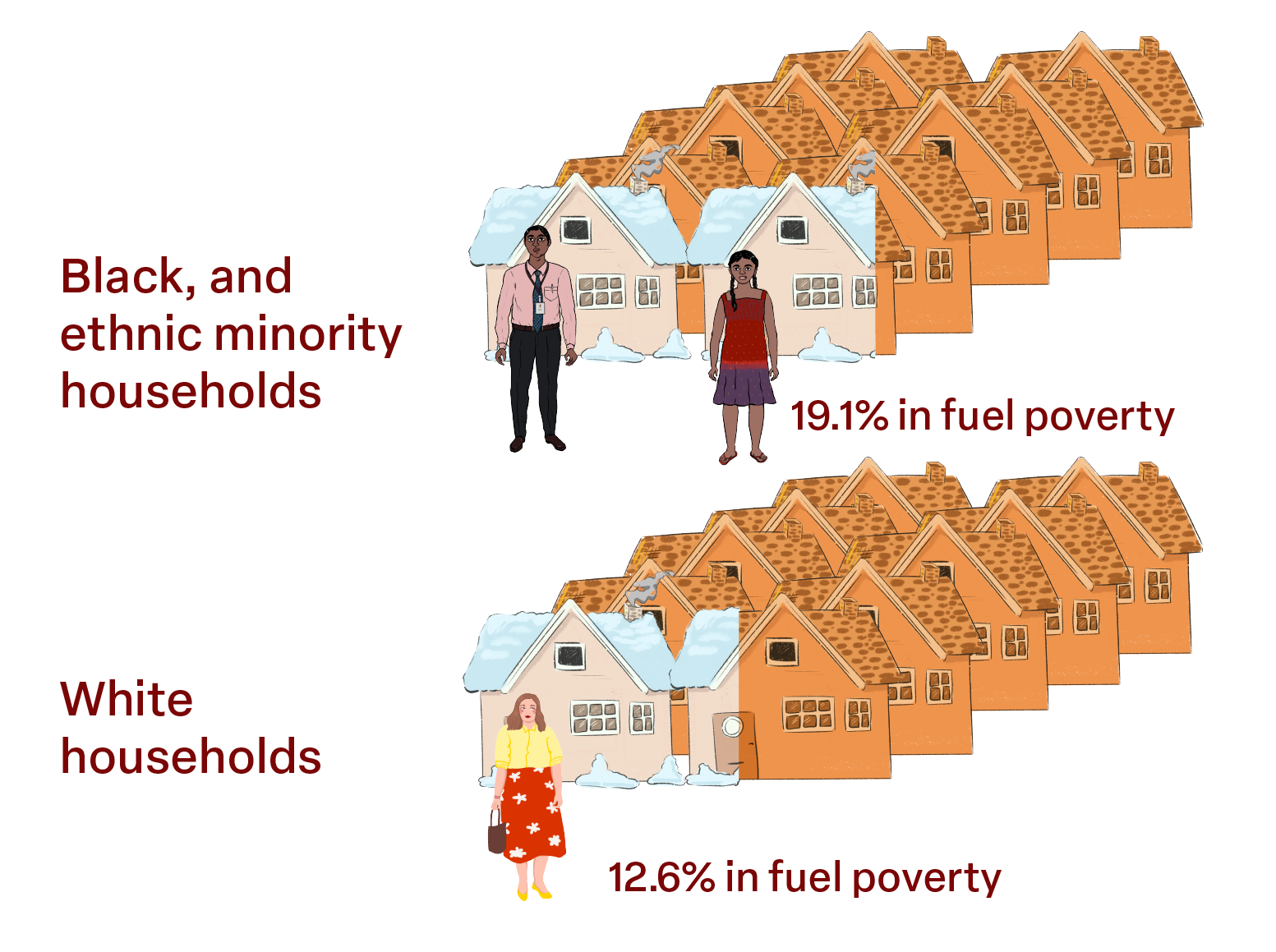
In the two years to March 2021, an average of 12.6% of white households were experiencing fuel poverty compared to 19.1% of Black, Asian and Minority Ethnic households. Source: Ethnicity Facts Figures Data visualisation © Greenpeace / Laura Yates, with icons © Ravista Mehra
Shell supplies around 10% of the UK’s total oil and gas needs. In 2021, as the cost of living crisis was beginning to bite, the company saw profits soar from US$4.8 billion to US$19.3 billion. 63% of Shell’s earnings in the final quarter alone were from its gas, renewables and energy solutions division. The company has said its “monster integrated gas earnings” have benefited from higher prices and trading margins. Meanwhile people of colour across both the global North and South are living in increasing precarity.
People of colour are more likely to live in poverty than their white counterparts and are also more likely to live in economically deprived, urban areas that are at particular risk of environmental disadvantage. With the exception of Indian and Chinese groups, people of colour are more likely to live in the 10% most overall deprived neighbourhoods in England. These are the very neighbourhoods that tend to be impacted by air pollution, and lack of access to green spaces, and that have higher concentrations of waste facilities.
“While wealthier, whiter communities can escape the impacts of the environmental emergency, low-income communities and people of colour, otherwise known as the ‘multiracial working class’, cannot.”
While wealthier, whiter communities can escape the impacts of the environmental emergency, low-income communities and people of colour, otherwise known as the ‘multiracial working class’, cannot. The multiracial working class are often among those most affected by exposure to the health effects of environmental harm, such as air pollution.
In the UK, links between socio-economic deprivation, racism and environmental degradation have been well-documented, with evidence that the most marginalised communities are most burdened by environmental harm. For example:
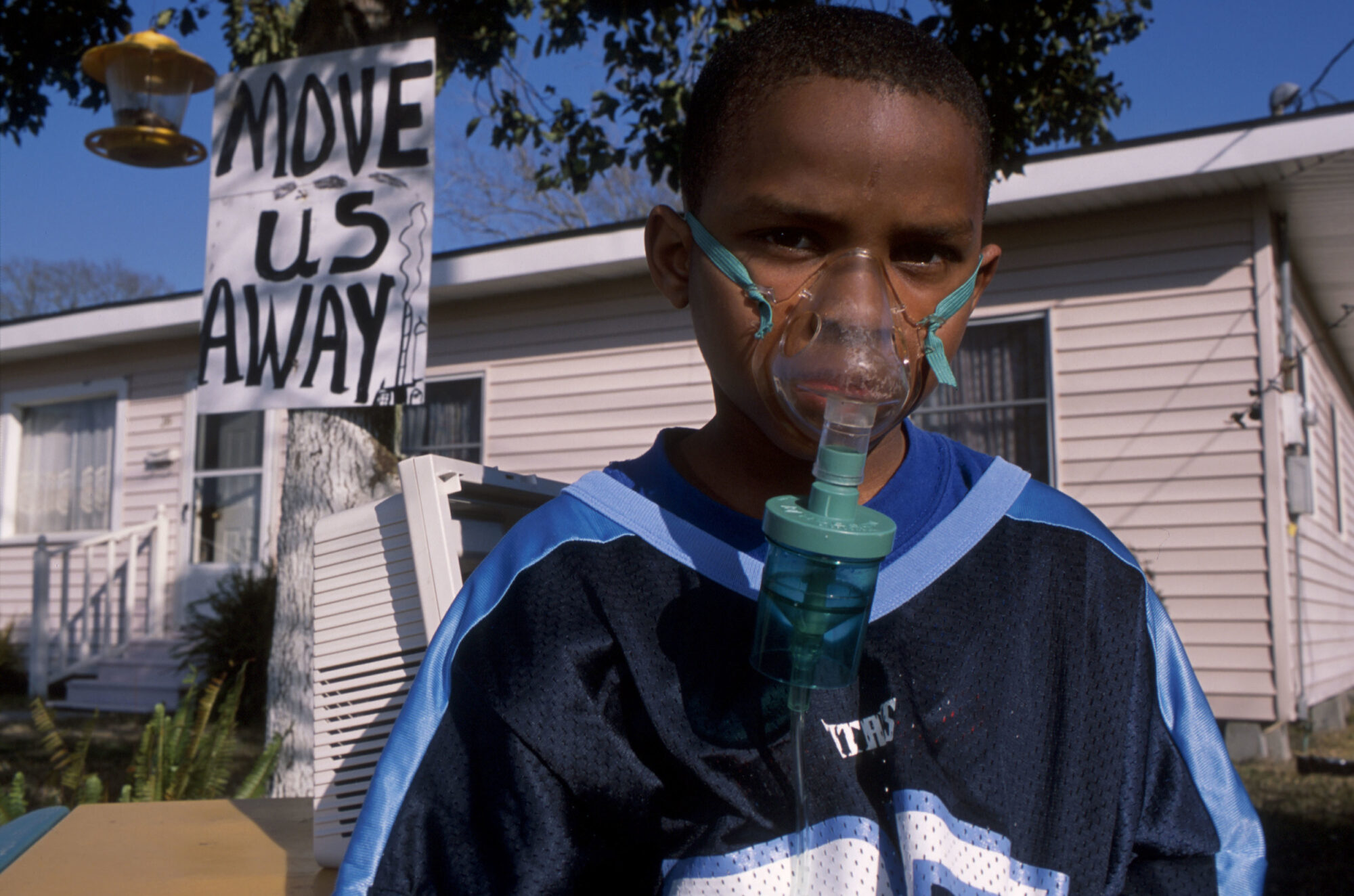
Gregory Jackson Jr., who has had respiratory problems since birth, in front of his home in Norco, Louisiana in 2001. Norco is in a ‘Cancer Alley’, an area along the Mississippi River between Baton Rouge and New Orleans, that contains numerous industrial plants and where health problems are notoriously prevalent. © Les Stone / Greenpeace
The same disregard for the lives of people of colour in the global South, underpins the decision to locate polluting industries in the UK near deprived areas. Activist and academic Alexandra Wanjiku Kelbert of Black Lives Matter UK describes these ‘sacrifice areas’:
This reflects a broader global trend of environmental injustices and sacrifice areas for people of colour in global North countries, which includes the “targeting of communities of colour for toxic waste facilities, the official sanctioning of the life-threatening presence of poisons and pollutants in our communities, and the history of excluding people of colour from leadership of the ecology movements”. In the US, an understanding of these inequalities spurred the environmental justice movement in the 1970s and was championed by people of colour.
Approximately a quarter of a million people in the US currently live in areas in which incidents of cancer caused by air pollution exceed the current limit of ‘acceptable’ risk set by the US government. These sacrifice areas are concentrated in areas with high populations of people of colour and low-income populations, including an area along the Mississippi River referred to as ‘Cancer Alley’ because of its high levels of petrochemicals.
In Central and Eastern Europe, Roma communities are disproportionately affected by pollution and likely to live near waste dumps or contaminated sites. The European Environmental Bureau found 32 cases of environmental racism against Roma people in five European countries: Hungary, Bulgaria, Slovakia and North Macedonia, which included Roma communities living near waste sites with no access to electricity or water, and living in improvised shelters made from landfill.
Across the UK, waste incinerators burn rubbish into ash, flue gas and heat. People living nearby complain about the noise and smells that they emit, which sometimes become so unbearable that residents avoid going outside. In December 2021, the All Party Parliamentary Group on Air Pollution called for an immediate halt on the expansion of waste incineration, due to significant concerns about its health impacts and environmental harm.
Waste incinerators are a clear example of a form of environmental harm which disproportionately impacts people of colour, who are more likely to live in their vicinity. An investigation by Greenpeace UK in 2020 found that almost half of all existing incinerators are in areas with high populations of people of colour. The wealthiest 20% of neighbourhoods host just eight of the 90 current incinerators, whereas the 20% most deprived areas host over a quarter of waste incinerators in the UK.
These findings have been corroborated by decades of research, including a landmark Friends of the Earth study released in 1999. The study found that 662 of Integrated Pollution Control Sites, including waste facilities, were located in areas with an average household income of less than £15,000 (equivalent to more than £27,000 today). More recent research illustrates that 50 proposed new incinerators are considerably more likely to be built in the poorest areas of the UK, including deprived areas of Birmingham and Stockton on Tees, than in the more affluent ones such as parts of West London. Two examples of this come from the EcoPark Waste Incinerator in Edmonton, London, and Splott, Cardiff.
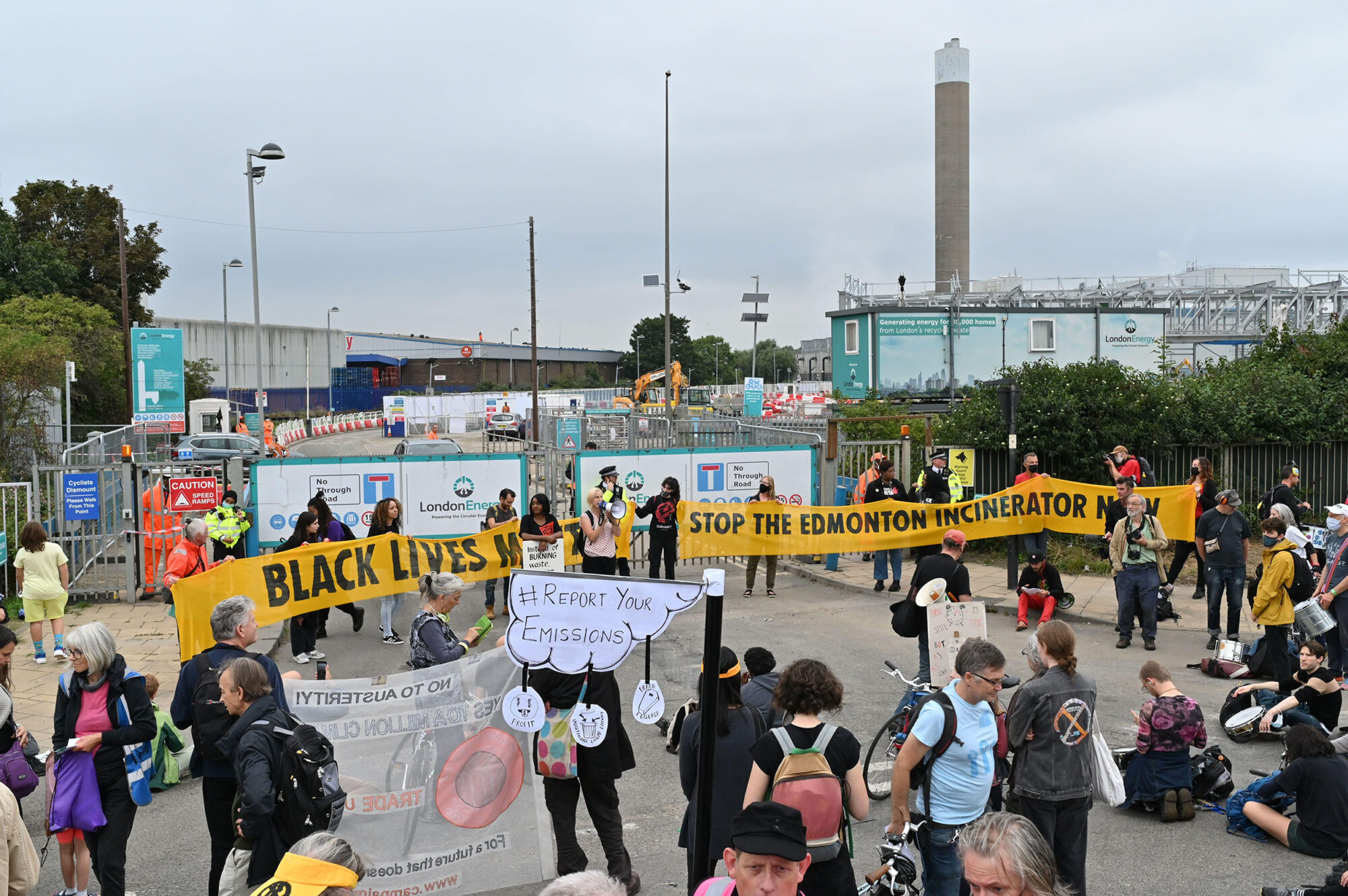
Local groups including Enfield Black Lives Matter and Extinction Rebellion protest against the redevelopment of the Edmonton incinerator, September 2021. Credit: Andrea Domeniconi / Alamy Stock Photo
The Edmonton EcoPark waste incinerator is located in one of the most deprived areas in England, where 65% of residents are people of colour. The incinerator is the largest in the UK and deals with waste from seven North London boroughs. In 2017, a Planning Development application was submitted and accepted for its renovation, despite the protests from several campaign groups, including Enfield Black Lives Matter and Extinction Rebellion, who argued that the incinerator will release pollutants into the air which will disproportionately impact people of colour. Delia Mattis, a campaigner from Enfield Black Lives Matter, and an organiser of a protest that attracted hundreds around the incineration site in September 2021, said:
Campaigners in Edmonton have highlighted the contradictions between a decision not to build a waste incinerator in Cambridgeshire County council following residents’ concerns, in contrast with the decision to redevelop Edmonton EcoPark in 2017:
In Splott, Cardiff, a biomass plant was approved in 2018 next to a Gypsy Roma Traveller site – in an area already suffering from low air quality. Campaigners against the plant argue that the site would be hugely impacted by the development of the plant, with evidence that the Gypsy Roma Traveller community would be disproportionately impacted as a number of residents already have pre-existing health conditions. The East of Cardiff, where Splott is situated, is at risk of up to three incinerators being built in close proximity to homes and schools.
The Silvertown Tunnel is a proposed £1.2 billion construction that will run beneath the River Thames, between the Greenwich Peninsula in South-East London and the Silvertown area in Newham, East London. Campaigners against its construction argue that the construction of the tunnel alone will produce around 82,077 tonnes of carbon dioxide, as well as significantly increase the number of cars and traffic in East London.
Speaking to a newspaper earlier this year, a resident of the Silvertown region in Newham described the construction of the tunnel as something that “reinforces structural inequalities rather than solves them”. Newham is one of the most deprived boroughs in London and half of all children in Newham live in poverty, while 71% of Newham’s population are from a Black, Asian or ethnic minority group. On average, Newham residents are exposed to a level of air pollution that is a third higher than World Health Organisation (WHO) guidelines suggest (see Figure 5), and it is estimated that 96 residents die every year due to poor air quality.
Environmental justice campaigners argue that the campaign situation in Silvertown reflects the bigger picture in England – in which people of colour are disproportionately exposed to and are particularly vulnerable to air pollution. Choked Up, a group of young climate justice campaigners fighting for a Clean Air Act in the UK, have described how “as young people of colour who live in these communities, it is clear to us that communities in London do not carry the burden of air pollution equally”.
A study conducted on behalf of the Mayor of London found that Black people in London are more likely to breathe illegal levels of air pollution than white and Asian groups.
Within London, many areas with a high proportion of Black residents have dangerously high levels of air pollution. For example, Lambeth, a borough with a higher than average Black population, recorded levels of nitrogen dioxide in the air that were almost double the WHO guidelines. Outside of London, researchers found that the levels of air pollution in Birmingham were higher in communities with a high proportion of Black and ethnic minority residents and in low-income areas.
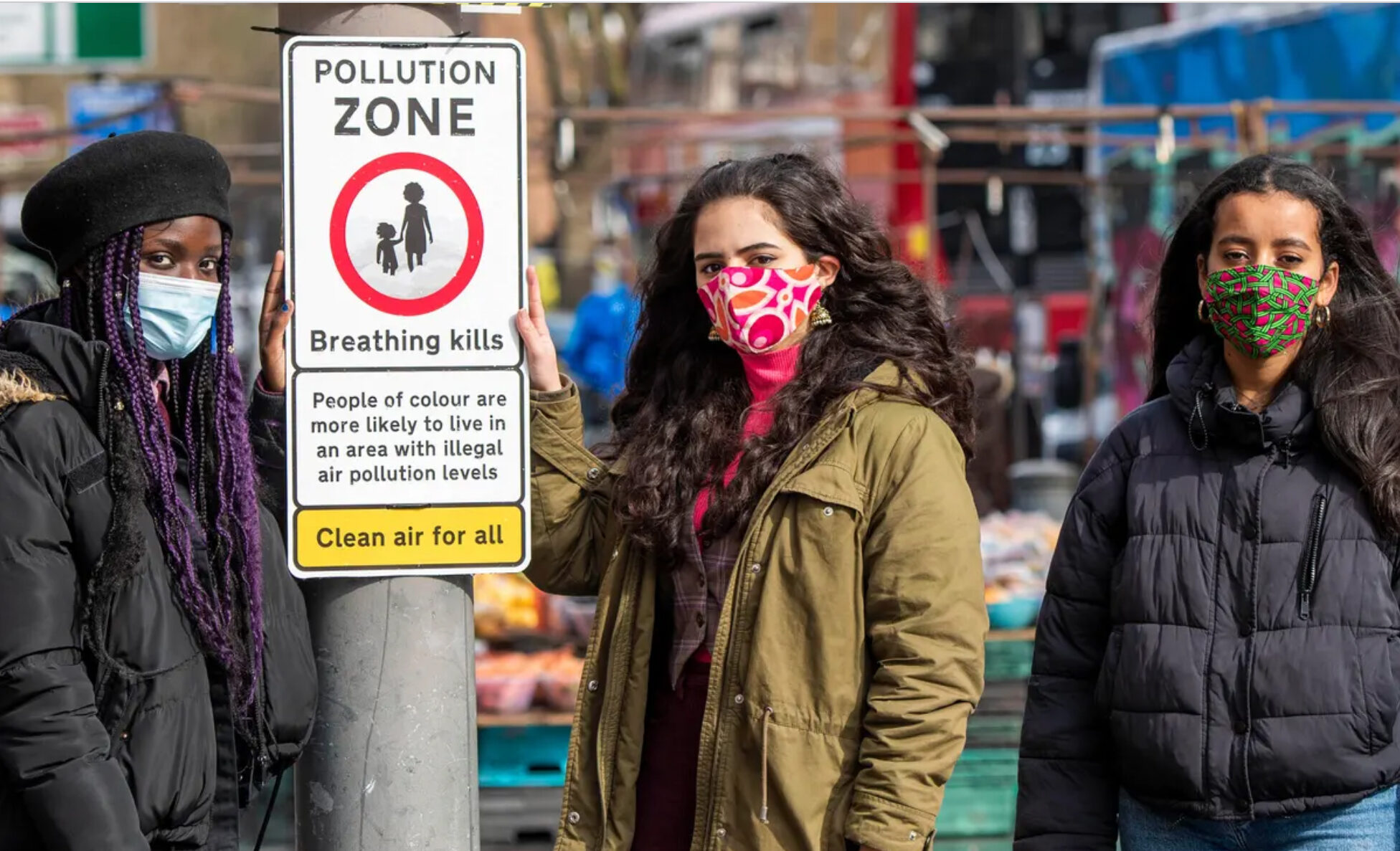
The co-founders of Choked Up, an anti-pollution campaign in London, from left: Destiny Boka Batesa, Anjali Raman-Middleton, Nyeleti Brauer-Maxaeia. The group are putting ‘hacked’ road signs up across the capital to highlight the disproportionate impact that toxic air has on people of colour. © Choked Up
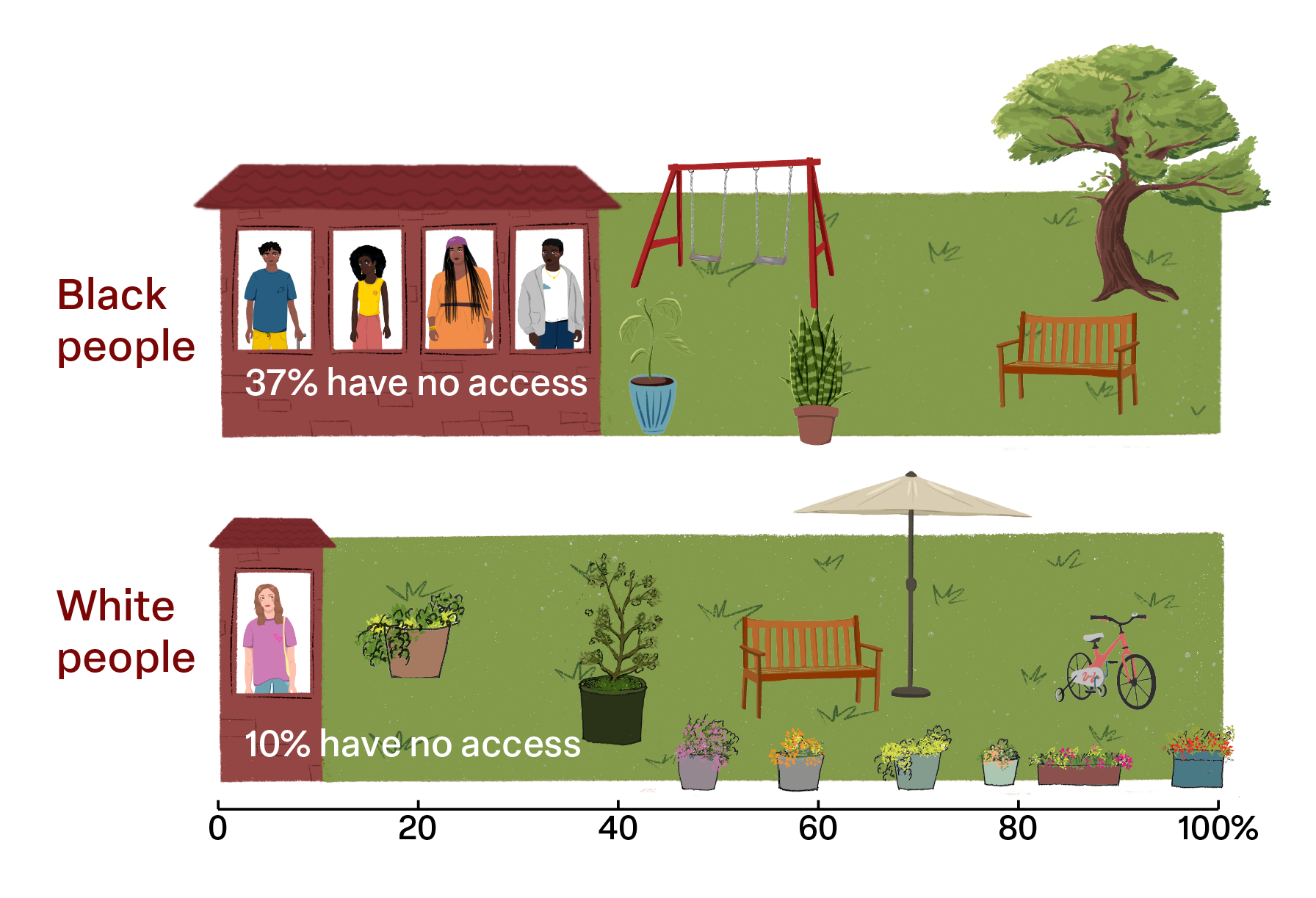
Taken from: Percentage of people with access to a private garden, private communal garden, or balcony/patio/yard, by ethnic group, England, 2014 to 2019. Source: ONS Data visualisation © Greenpeace / Laura Yates, with icons © Ravista Mehra
People of colour in the UK tend to lack access to quality green spaces. In 2019, 69% of white people reported visiting natural spaces at least once a week compared to 41% of Black people and 38% of Asian people. As a result of this lack of access, people of colour are losing out on the benefits that access to natural space affords them in terms of mental health and wellbeing, as well as a chance for recreation and exercise. Organisations such as Black Girls Hike, which provides “a safe space for Black women to explore the outdoors”, and Land In Our Names, which strives to “create strong networks between BPOC growers, herbalists, landworkers, ecologists and other land-based practitioners”, have sprung up to plug the gap that people of colour face in accessing nature and green spaces.
Underpinning this is evidence that people of colour face glaring housing disparities without sufficient access to green space. According to Office of National Statistics (ONS) data published in 2020, Black people are nearly four times more likely than white people to have no outdoor spaces, including gardens and patios, in their home.
In addition, social and private renters are less likely to have green space than people who own their houses. This is significant because home ownership is much lower for most non-white ethnic groups, with just 20% of Black Africans and 46% of Bangladeshis owning a home, compared to 68% of White British households.
These disparities are partially rooted in direct experiences of racism. Black and Asian people are almost five times more likely to experience discrimination when looking for a safe, secure and affordable home.
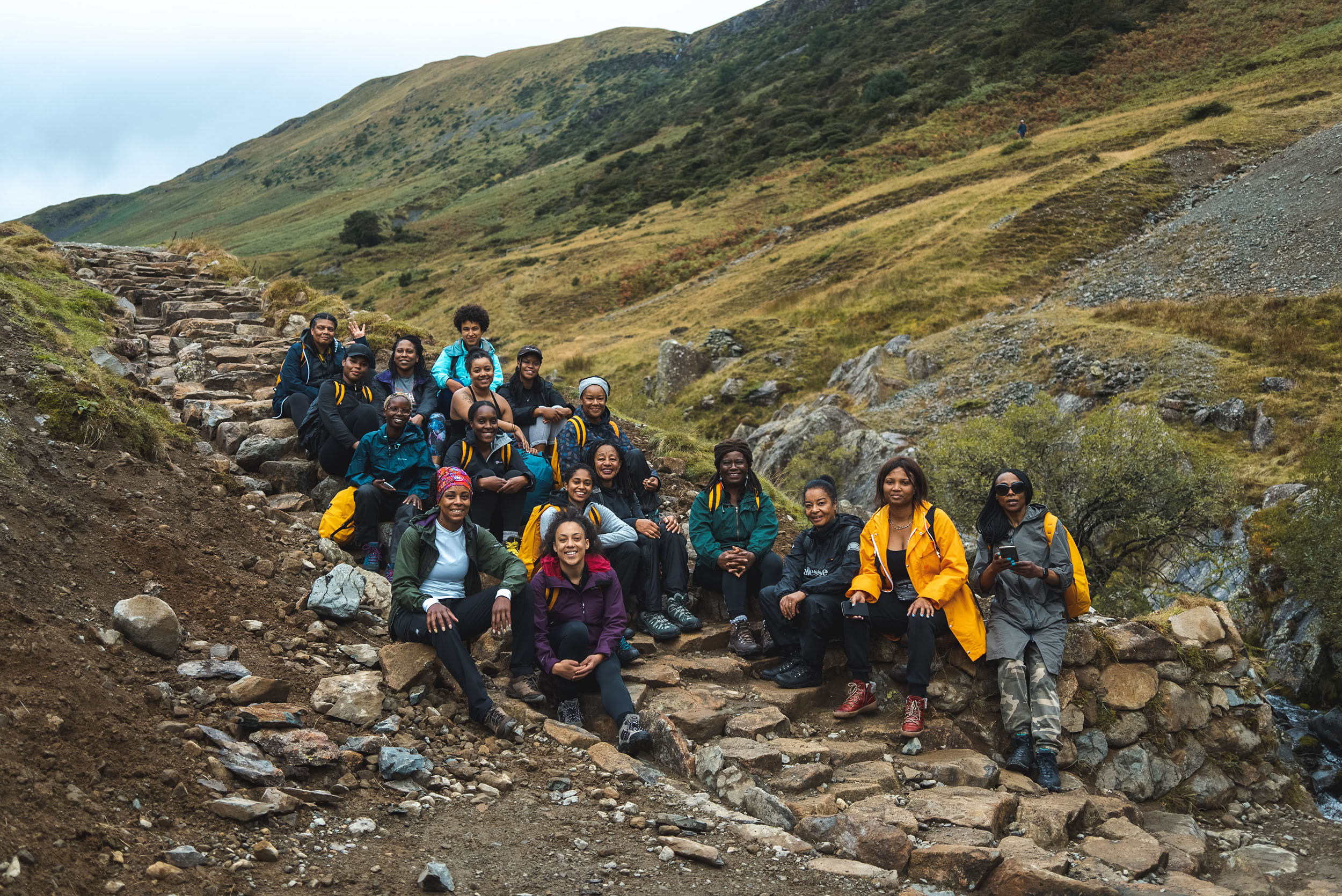
Black Girls Hike provides a safe space for Black women to explore the outdoors. Challenging the status quo, and encouraging Black women to reconnect with nature, they host nationwide group hikes, outdoor activity days and training events. © Frit Sarita Tam / Black Girls Hike
A future built on environmental justice?
This report illustrates how systemic racism and colonialism driven by powerful governments and companies are at the heart of the environmental emergency we face today, including those with links in the UK. This is particularly clear when looking at the extraction of global fossil fuels, commodities and plastic waste systems. A racist disregard for the lives and livelihoods of people of colour and Indigenous Peoples has not only left these communities worst affected by the unfolding climate crisis, but continues their oppression today.
It has become clear that if we want to meaningfully tackle the environmental emergency we have to address the racism to which it is so inherently linked.
Therefore the fight for environmental justice will not only help to tackle the climate crisis and biodiversity loss; it can also help to bring about the transformation of our economies, safeguard jobs and livelihoods, and fight inequality. The key principles to achieve this, including from the perspective of Greenpeace’s offices in the global South, would include the following.
This report has illustrated the role of the British establishment and key UK based corporations in historic and continued environmental injustices experienced mainly by Indigenous Peoples and communities of colour. In doing so, it puts a vital spotlight on these issues.
For justice to be achieved, those most responsible for the environmental emergency must be held accountable and pay their fair share of the loss and damage caused. Immediately this means, within international climate negotiations at COP27 and beyond, that vulnerable countries are provided with the finance already promised (and more) by developed countries for loss and damage caused by climate impacts, as well as support for adaptation. International organisations with technical expertise are also needed to support the effective delivery of this.
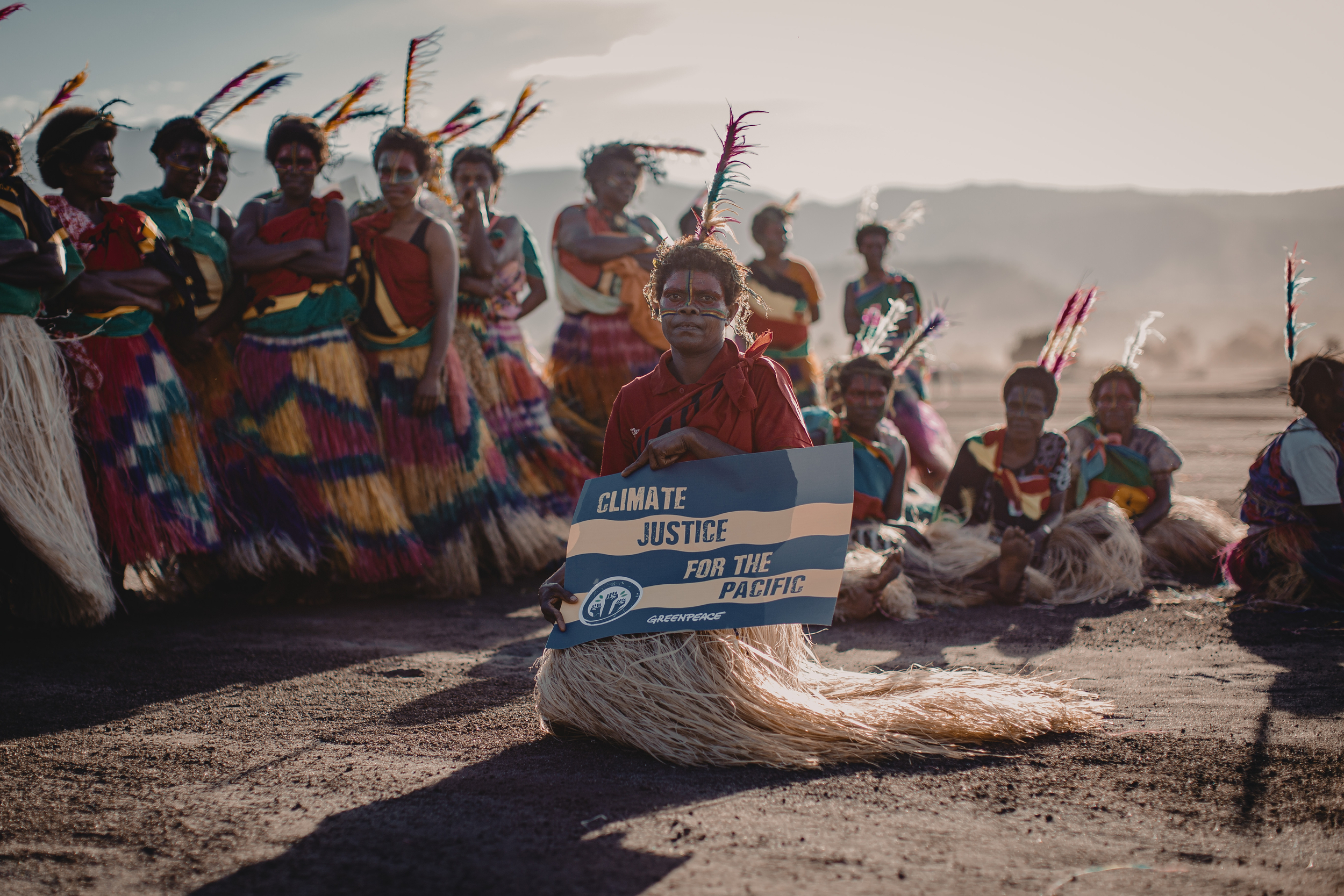
200 women climate activists, calling for climate justice in the Pacific, gather at Mount Yasur on the island of Tanna in Vanuatu, during COP26 in 2021. © Greenpeace
“For justice to be achieved, those most responsible for the environmental emergency must be accountable and pay their fair share of the loss and damage caused.”
Additionally there is a need for swift reparation, mainly from European countries and the US towards South American, African and Asian countries, because of the history of colonisation and exploitation, which have left many of these regions in a state of vulnerability, as illustrated in this report.
Power and wealth must be shifted to Indigenous Peoples, community leaders, activists, and experts from impacted and marginalised communities of colour, in order to tackle the environmental emergency in an equitable way. Also, their knowledge and experience must be centred in solutions for tackling the crisis.
For example, it is now widely recognised that the knowledge and actions of Indigenous Peoples are critical to the protection of some of the world’s most significant biomes. Recent analysis shows that the Paris climate goals to keep global temperature rise to below 1.5 degrees will fail unless Indigenous Peoples’ rights are protected.

Fridays for the future MAPA (Most Affected People and Areas) activists, calling on the UK government and world leaders to stop failing us on the climate crisis, outside the UN COP26 in Glasgow, UK, November 2021. Activists (from left) are: Farzana Faruck (Bangladesh), Maria Reyes (Mexico), Jakapita Faith Kandanda (Namibia) and Edwin Moses Namakanga (Uganda). © Jeremy Sutton-Hibbert / Greenpeace
Shifting power requires a redistribution of both political power and resources – such as land, wealth, technology and information – as well as changing policies and institutions that have perpetuated harm. This could include: debt cancellation, reforms to international institutions, taxation that makes polluters pay, enabling greater power or access for leaders, experts and activists from impacted communities in international negotiations, enactment of land rights and the patent-free sharing of green technologies with the global South.
“The knowledge and actions of Indigenous Peoples are critical to the protection of some of the world's most significant biomes.”
To prevent climate change, further harm to people and the loss of biodiversity, we urgently need development that considers sustainability, equality, wellbeing, and rural communities. Space for new thinking is needed around alternative ideas to promote progress that is based on the collective wellbeing of both humans and nature. This is so that economies don’t have to rely on drilling, logging, mining, dumping or other practices that exploit nature and harm local communities or Indigenous Peoples.
As part of this, it is crucial that the rights of affected communities and workers are protected and redressed through a just transition to greener, more sustainable practices and industries. This would require the full participation of workers and affected communities in shaping the process and outcomes, because, as the Climate Justice Alliance notes, “if the process of transition is not just, the outcome will never be”.
A just transition would also help to overcome the widening disparities in our society. For example, it would ensure access to sustainable food and energy for all by helping to address the current cost of living crisis in the UK, which has starkly demonstrated how critical food and energy are as people are forced to choose between ‘heating and eating’.
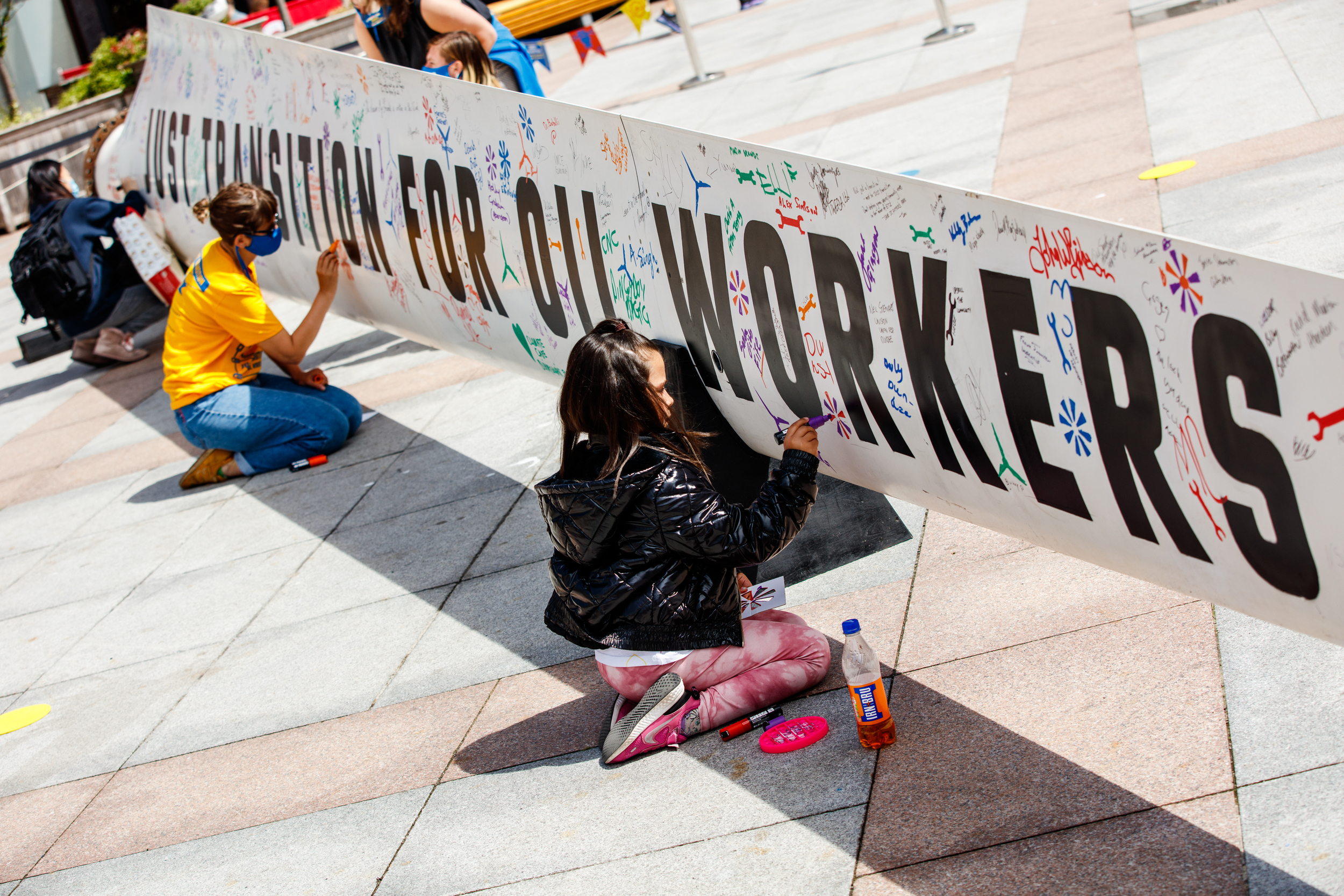
Members of the public sign a wind turbine blade in Dundee city centre to campaign for a just transition for oil workers to renewable energy. © Robert Ormerod / Greenpeace
As Greenpeace UK works towards tackling the climate crisis and preventing harm to people and biodiversity, it recognises that it has more to do to incorporate environmental justice into its campaigning. This is especially true if it is to successfully deliver on its priority goals to transform the global fossil fuel and food systems, over the next few years and into the future.
Greenpeace UK acknowledges it is on a journey and, as a global North office within an international organisation, has more learning, understanding and work to do to centre environmental justice. It intends to further this work through its campaigns and strategies on fossil fuels, food, oceans and plastics, as well as through its relationships with impacted communities, other allies and the wider environmental and climate justice movements in the UK and around the world.
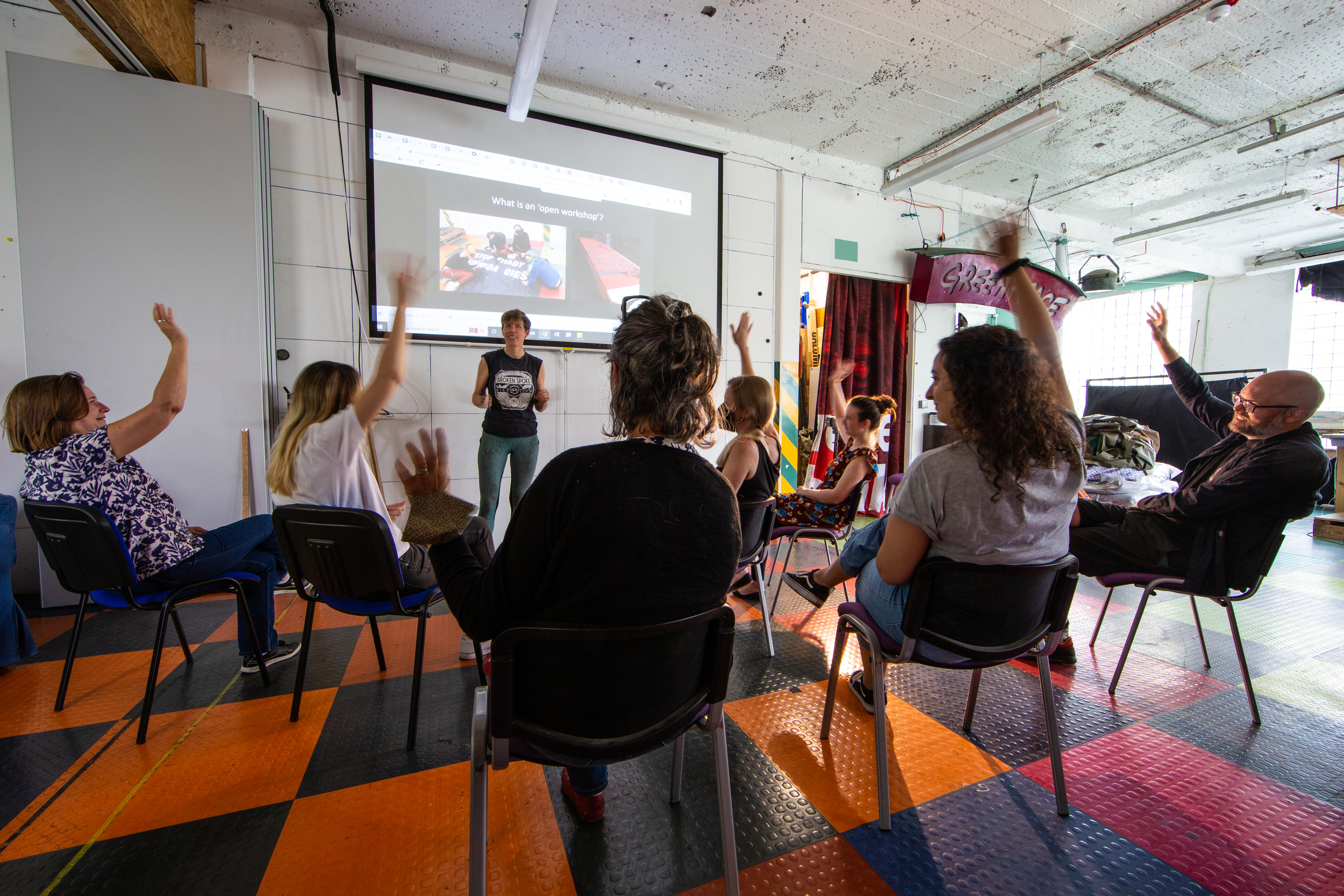
In parallel to this report Greenpeace UK has launched two initiatives that share time and resources with the wider movement for environmental and social justice.
The Open Workshop is a space where grassroots groups can access the Greenpeace UK warehouse space to design, plan and build campaigns. In the past, it has supported groups working on issues such as renters' rights, racial bias in policing, better working conditions for office cleaners, migrant rights and climate action. The Open Workshop acts as a community hub for activists who need a space or who want to learn a new skill.
The Movement Support Fund was created to contribute to the initiatives of groups that advocate for social, racial and/or environmental justice. This is to address some of the gaps from where they are the widest, and that often means funding. It can cover things like venue costs, equipment rentals, materials for actions, investigations or workshops, setting up a community fridge, to name a few.
Both initiatives are to support groups that have faced barriers in accessing space and resources due to systemic racism.
Here are some of the organisations referred to in this report, including information and ways to donate:
It’s clear that the environmental crisis cannot be addressed without also addressing racial justice. Change will only come about if leaders, experts, activists, communities and supporters of our intersecting movements act in solidarity with one another worldwide.
This consolidation of research, case studies and testimonials contributes to an understanding of the historical relationship between systemic racism and the environmental crisis, and the modern-day injustices experienced by people of colour and Indigenous Peoples as a result. Addressing these intersectional issues has become all the more crucial as the fights to end systemic racism and tackle the environmental crisis intensify. This report should support greater understanding and collaboration towards that goal.
As an organisation and as individuals, we at Greenpeace UK are committed to dismantling systemic racism, creating a community of allies and empowering people of colour. Today we’re making four commitments to improve the way we work on these issues.
This Black History Month, we’re telling the stories of Black people across the UK working in a variety of green jobs.
How do we tackle the climate crisis without harming workers in polluting industries? The answer is a ‘just transition’, that transforms the economy in a way that’s fair to everyone.
As we fight against environmental destruction and the climate crisis, we must advocate for a future that challenges oppression and allows everyone equal access to a safe planet.